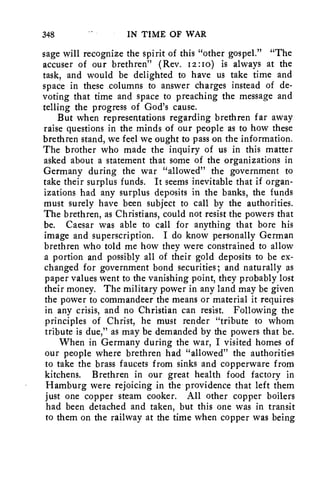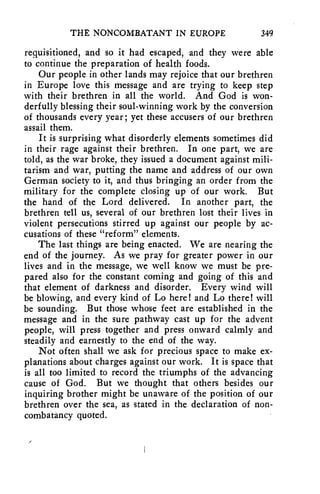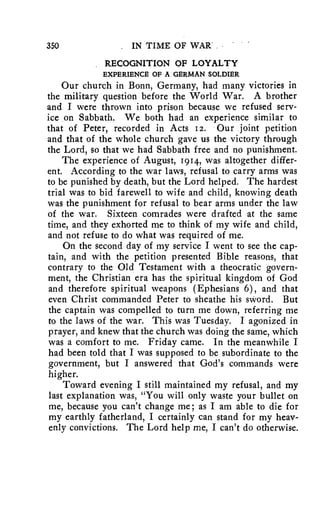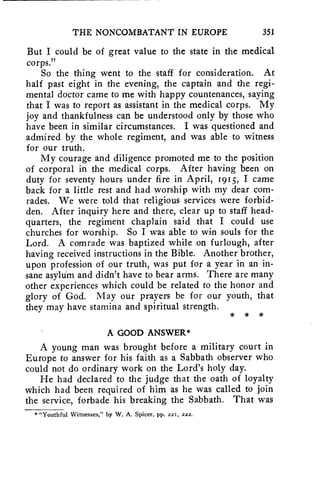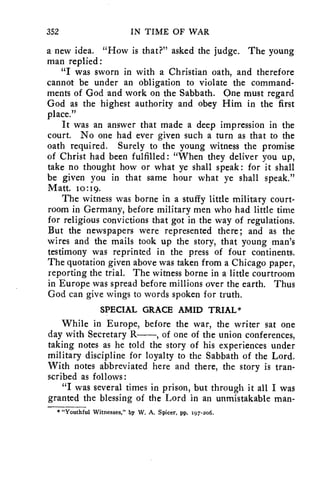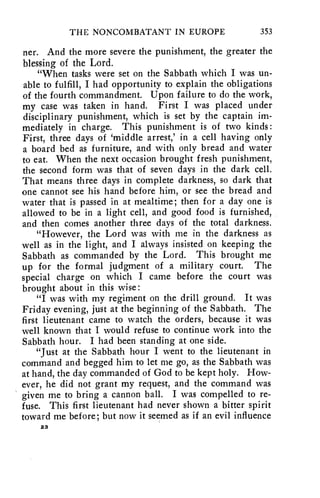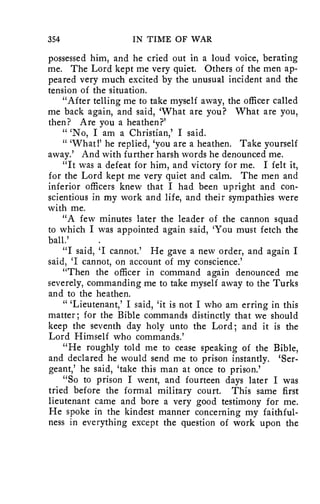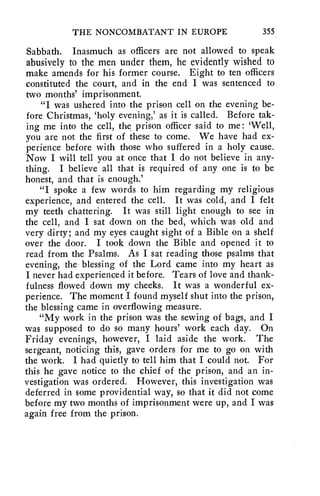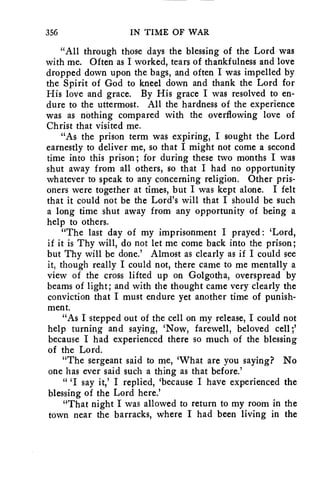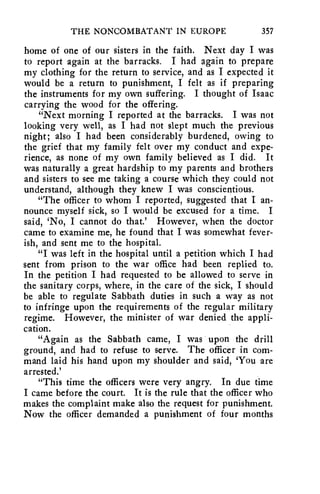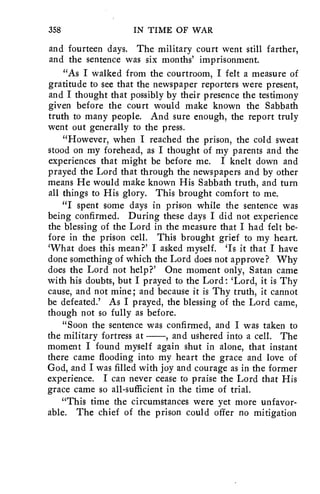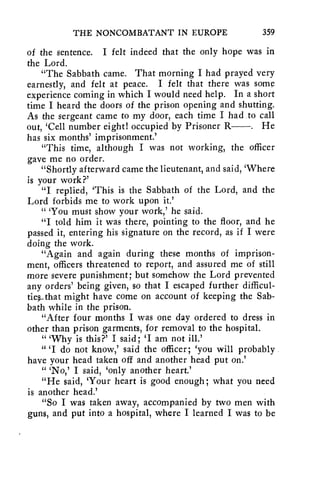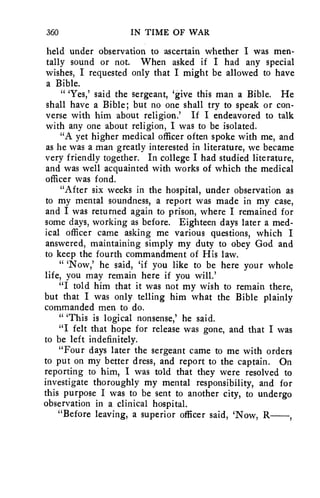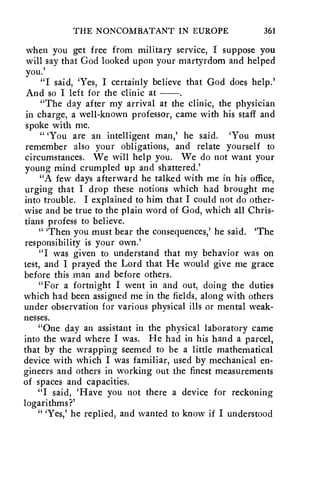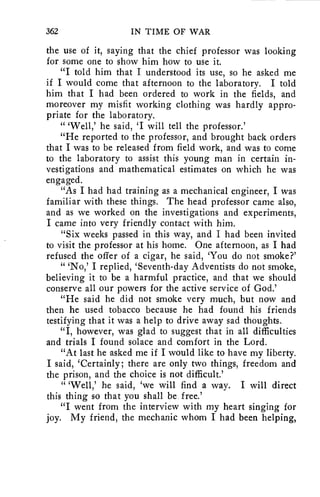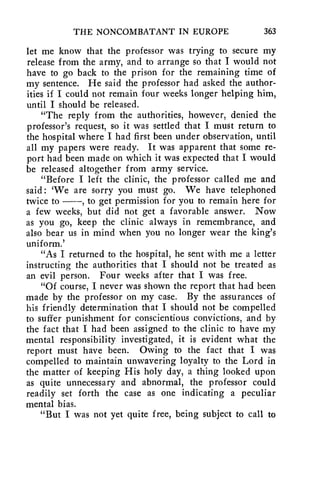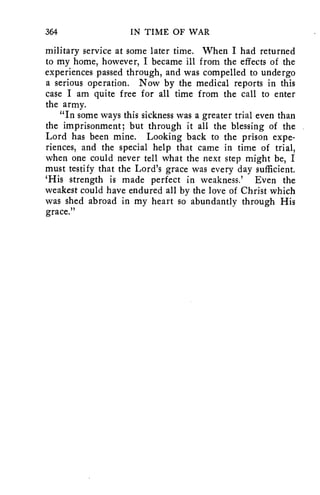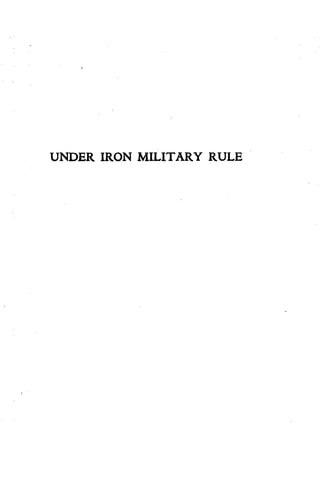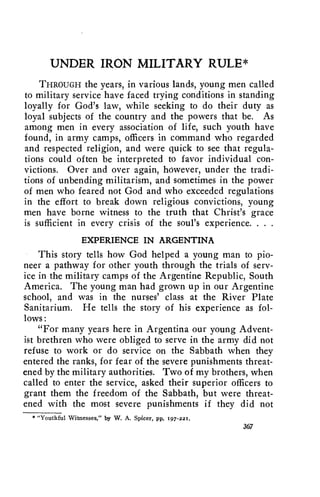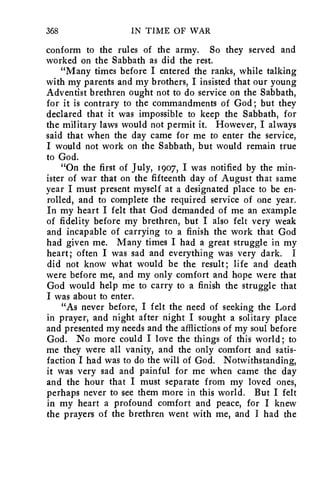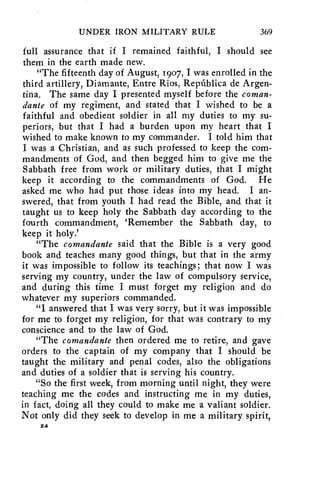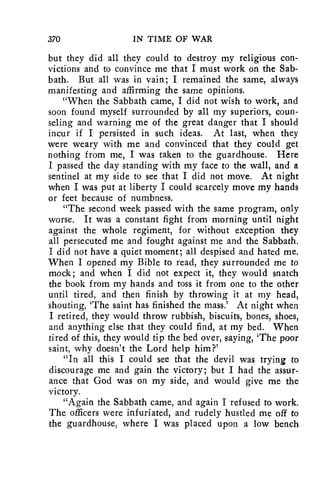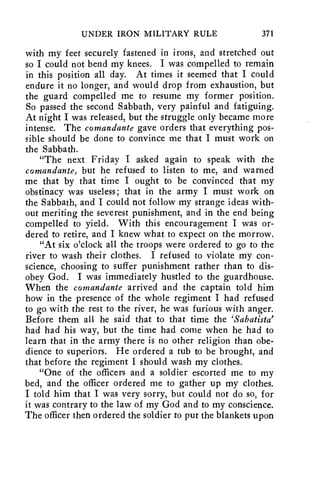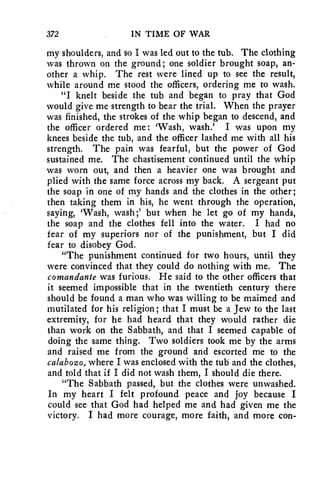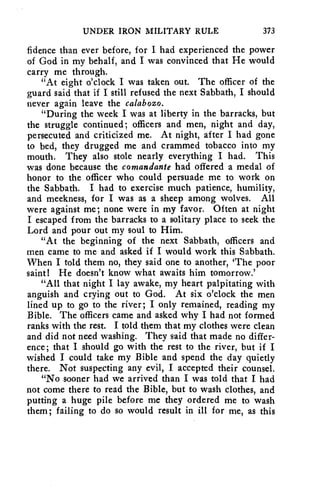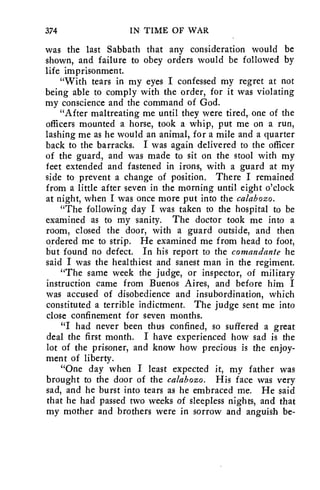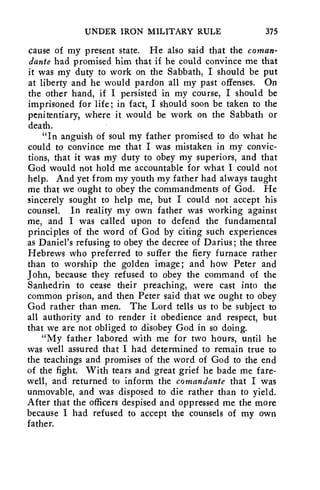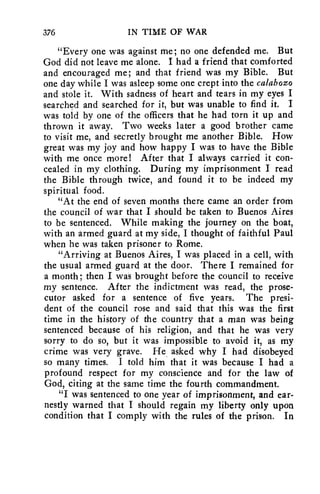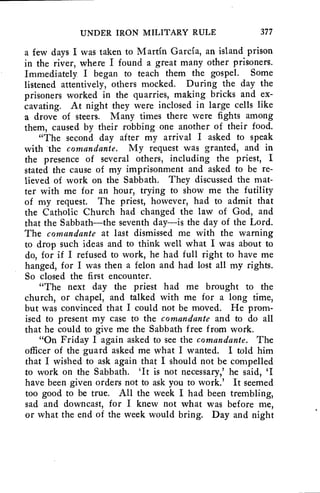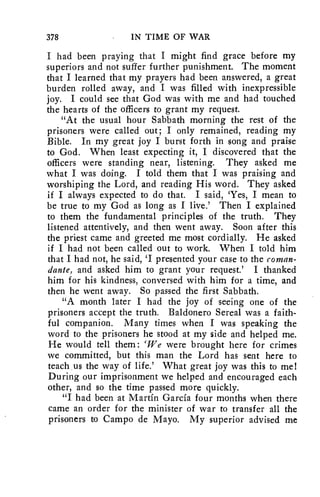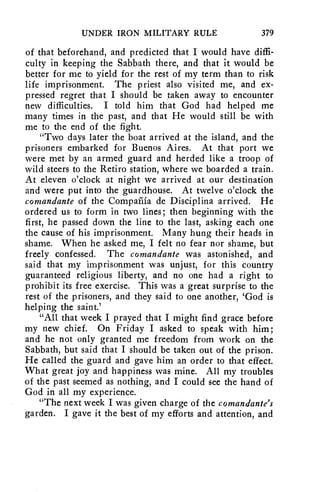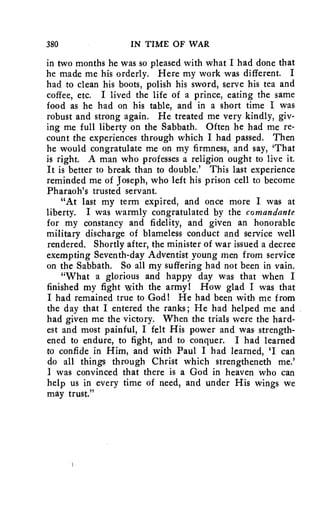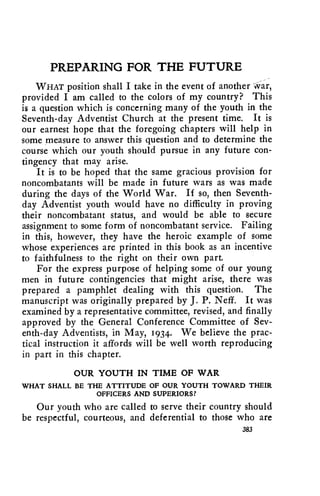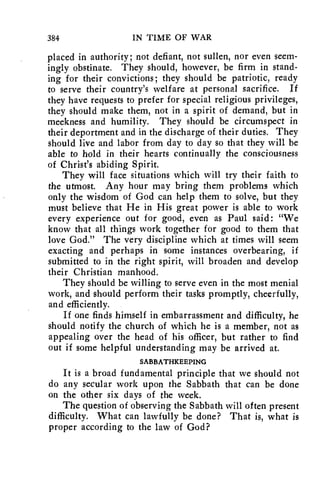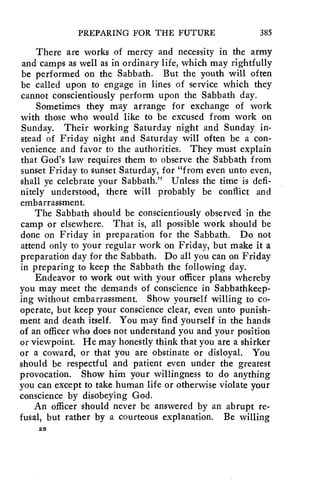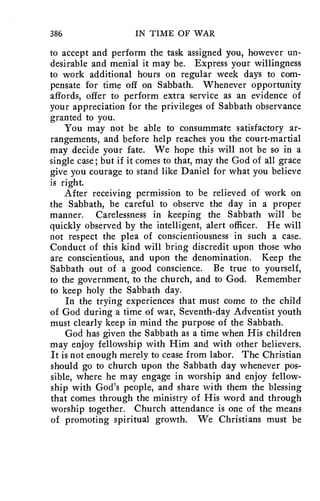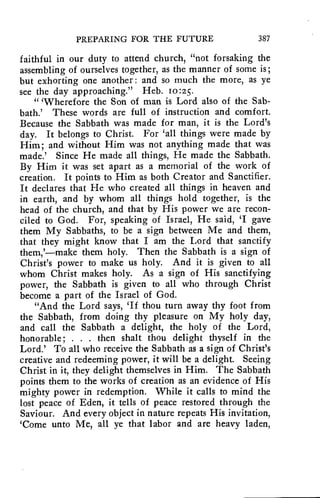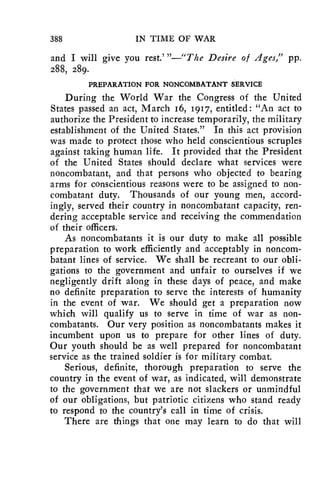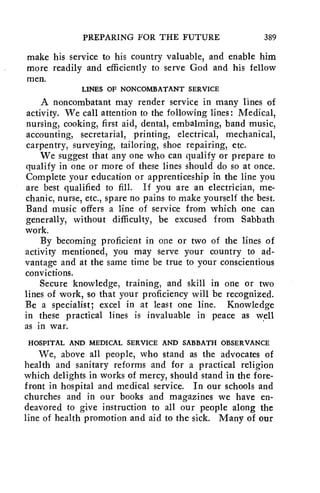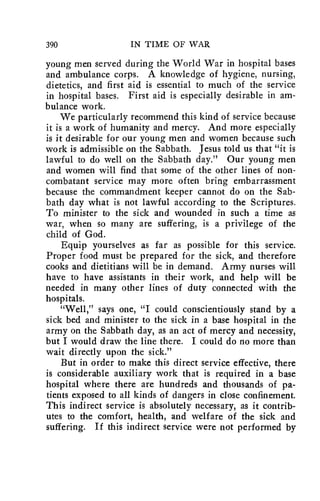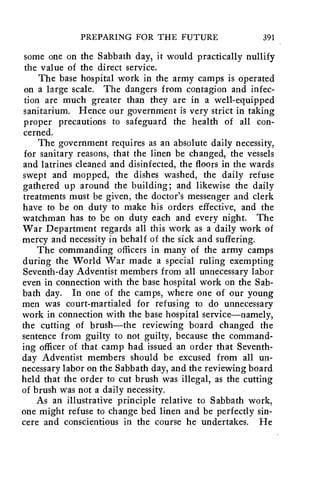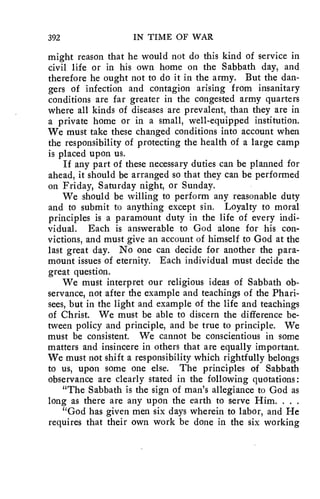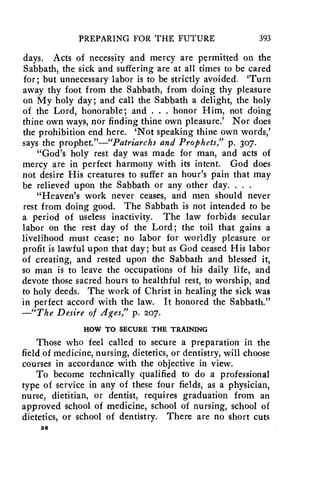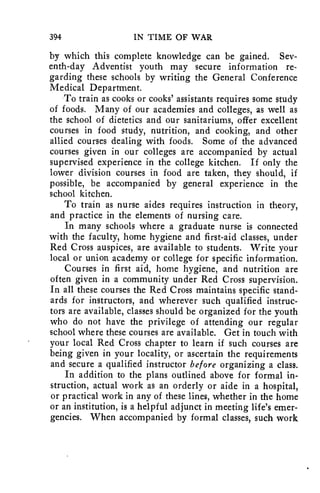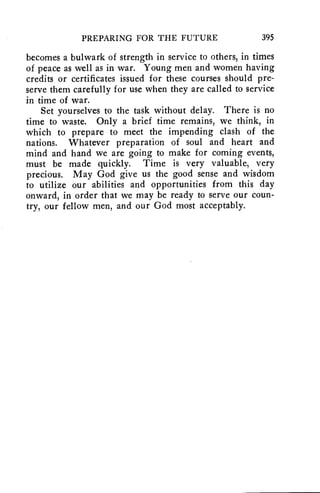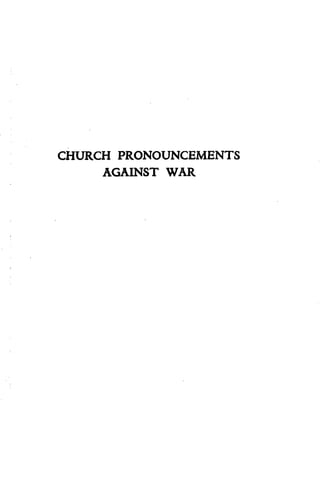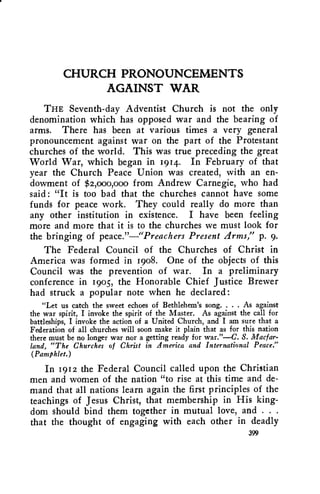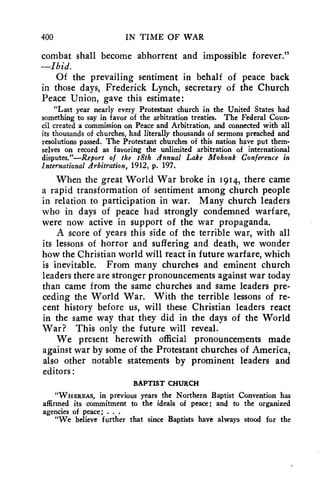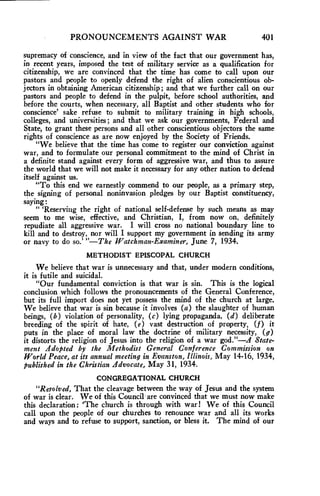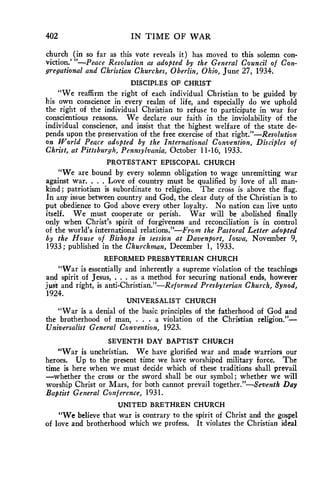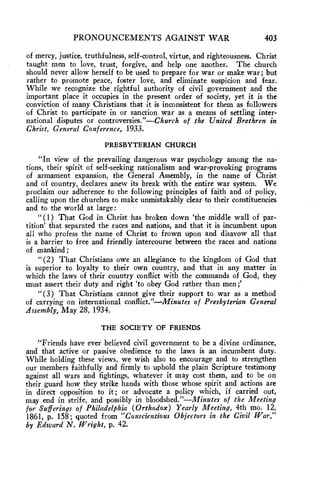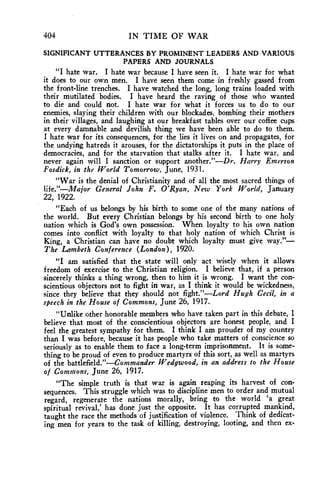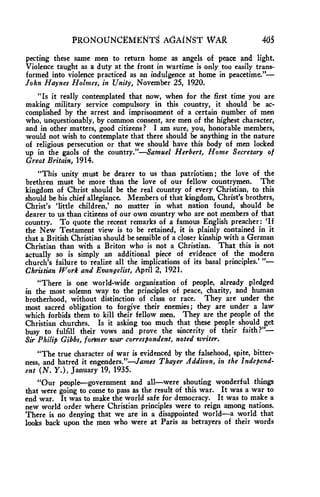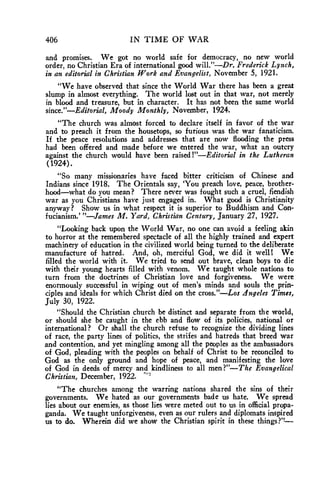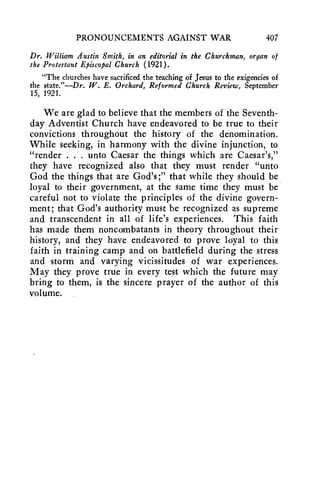The document discusses the principles and experiences of Seventh-day Adventists, particularly their stance on noncombatancy during wartime. It highlights their commitment to serving God while adhering to civil responsibilities, as well as the organization's growth and humanitarian efforts throughout history. The author aims to provide a compilation of experiences and teachings, reflecting the church's dedication to spiritual and social welfare despite the challenges faced during conflicts.
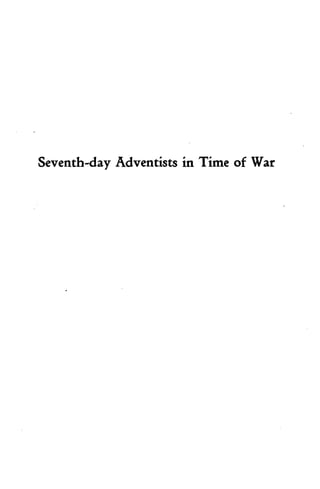
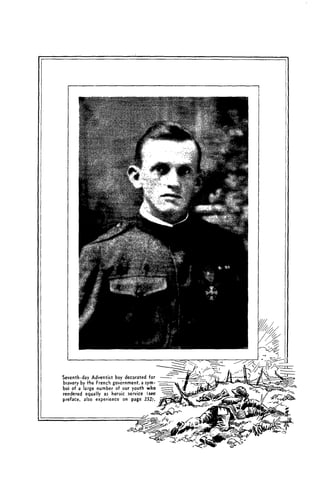
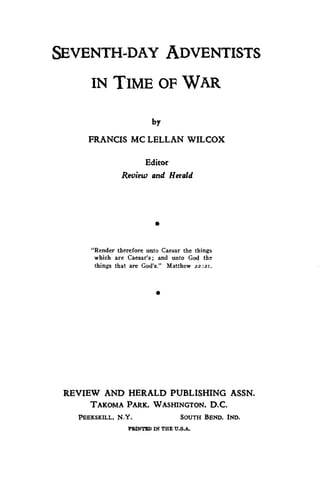
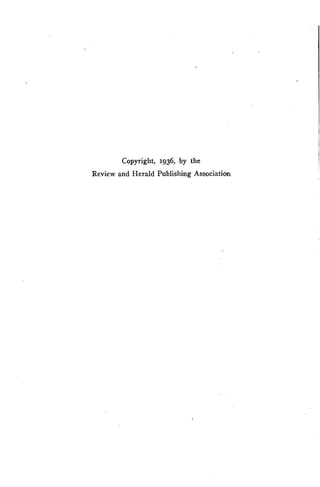
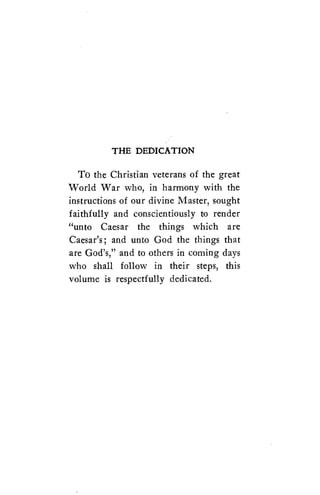
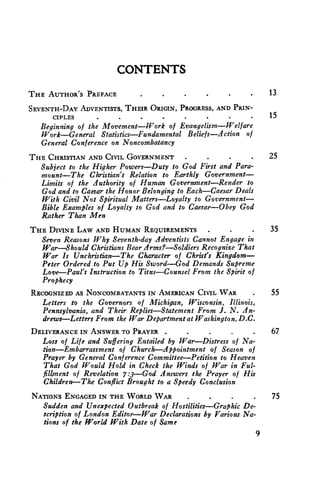
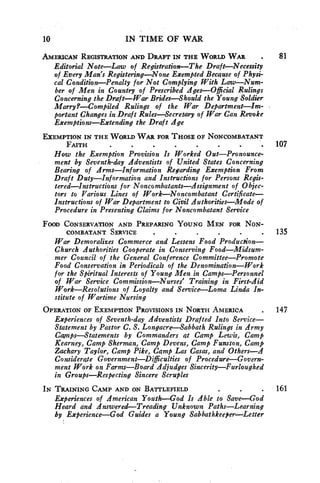
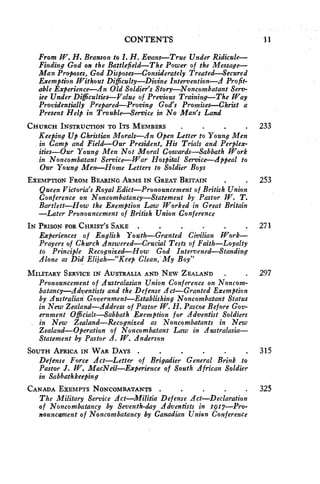
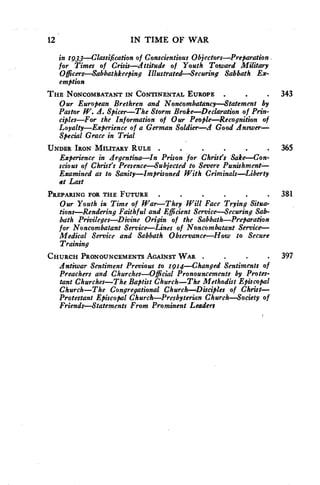
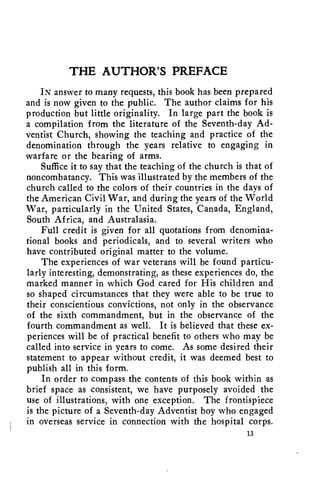
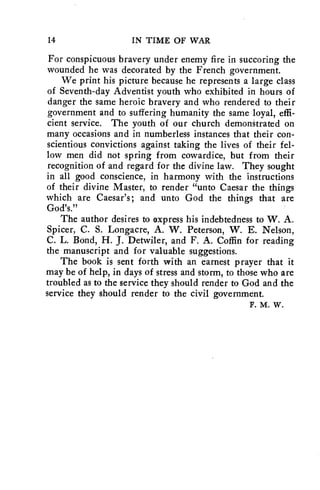
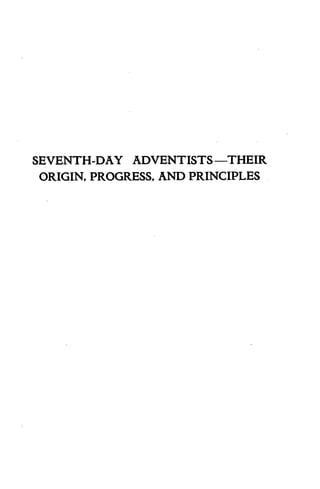
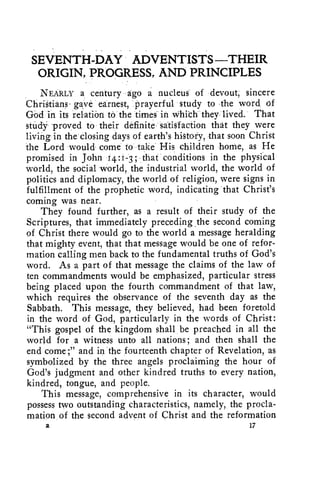
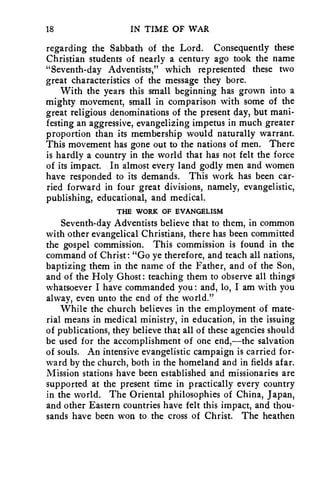
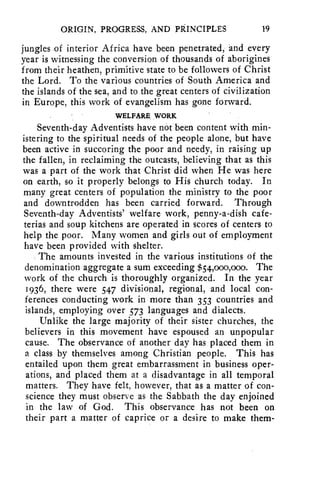
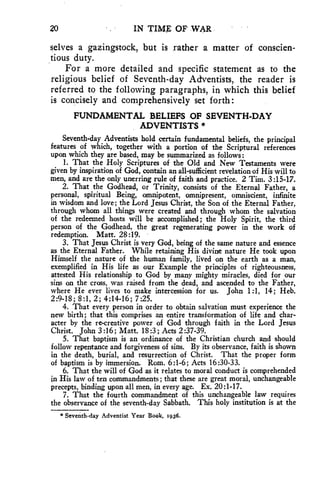
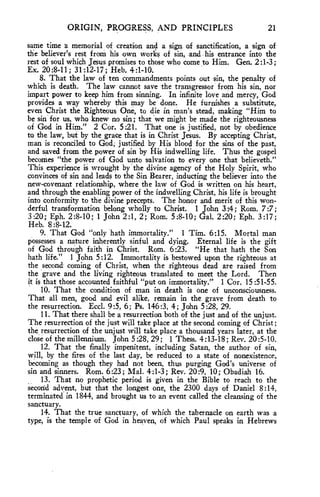
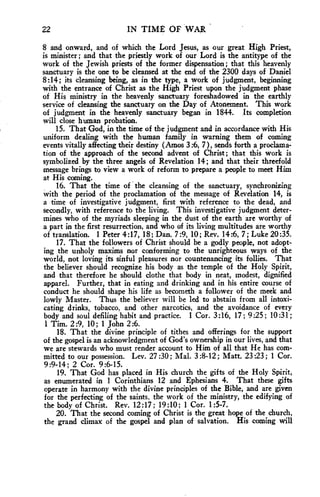
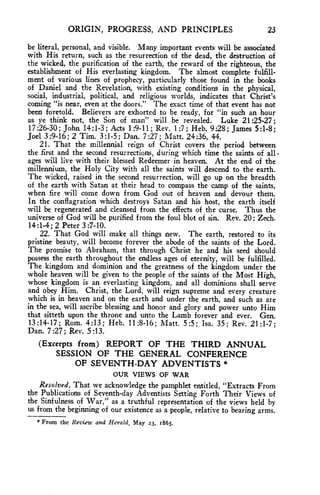
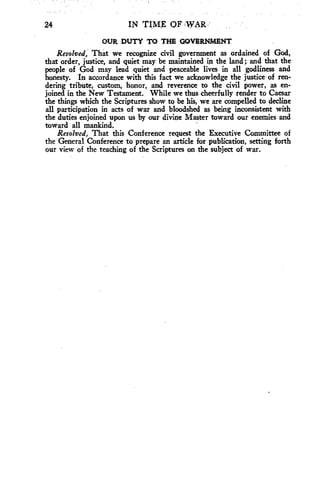

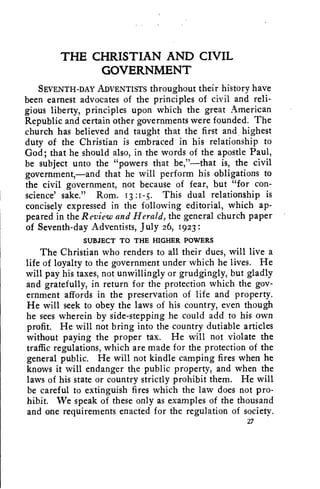
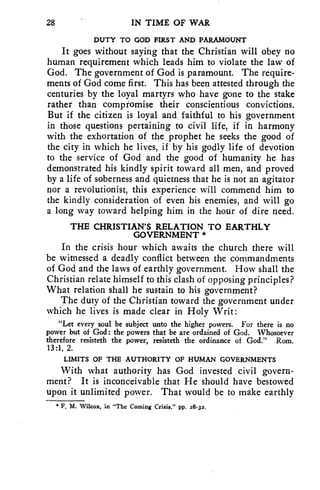
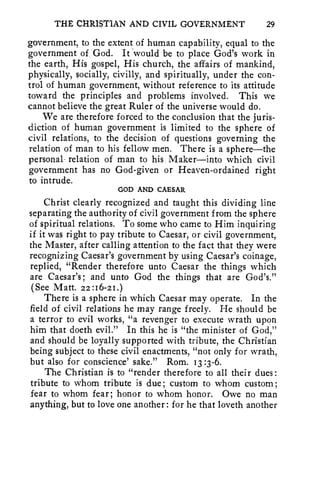
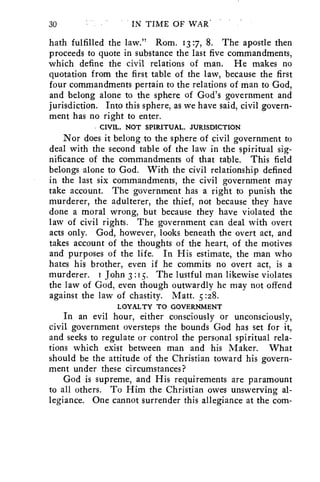
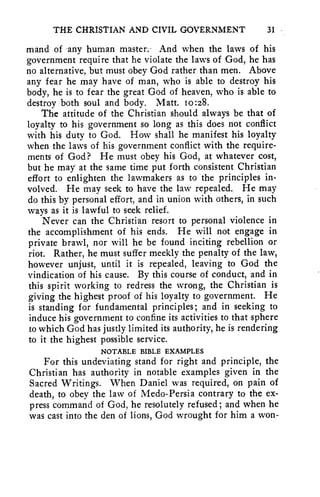
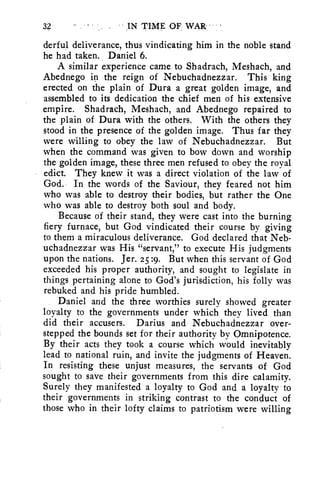
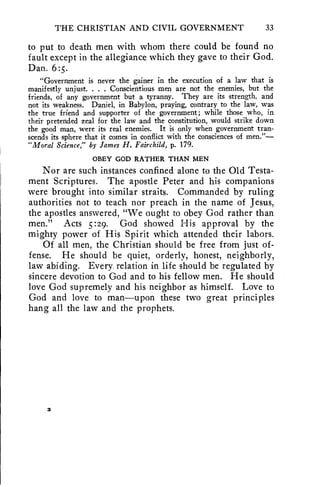
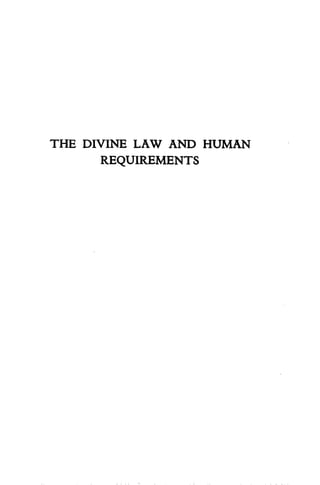
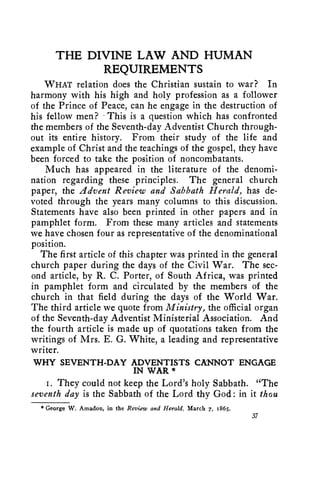
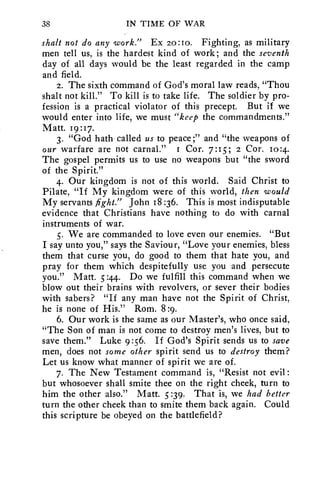
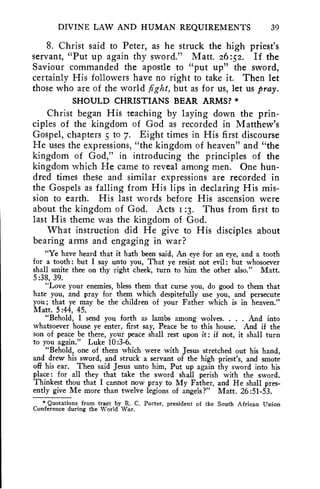
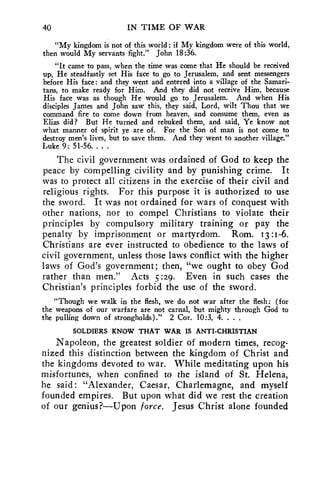
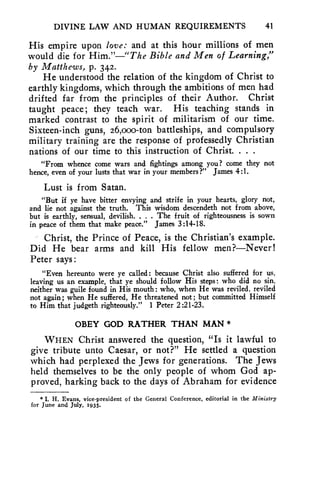
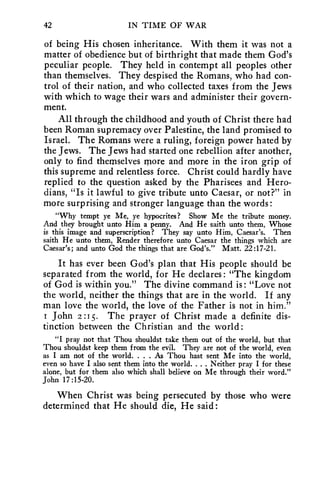
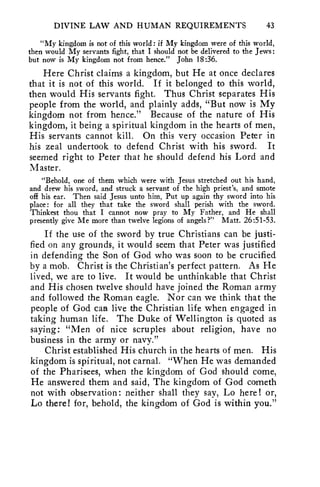
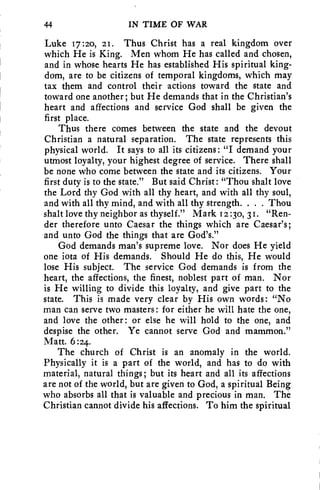
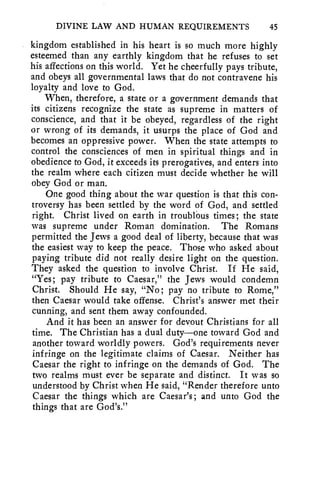
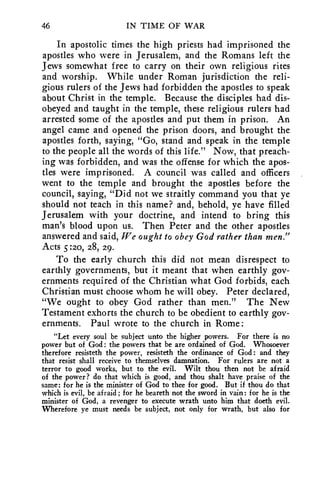
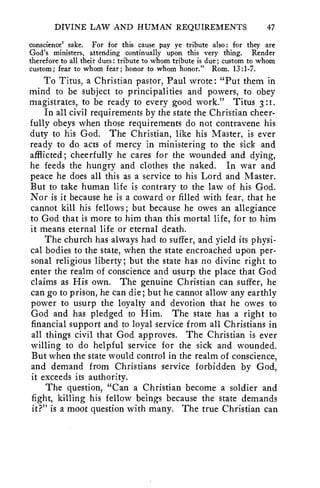
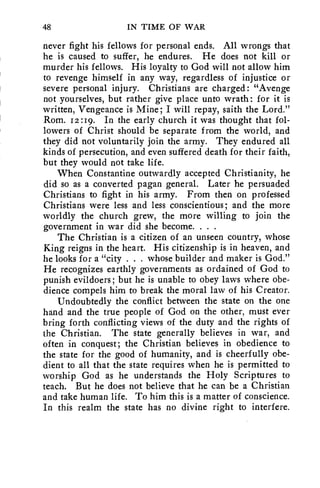
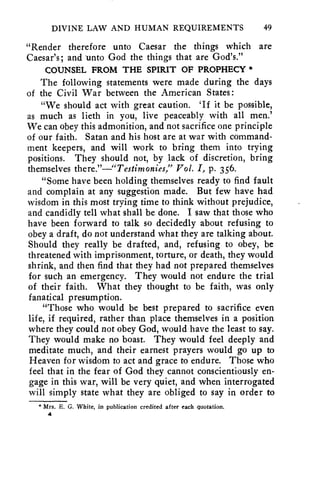
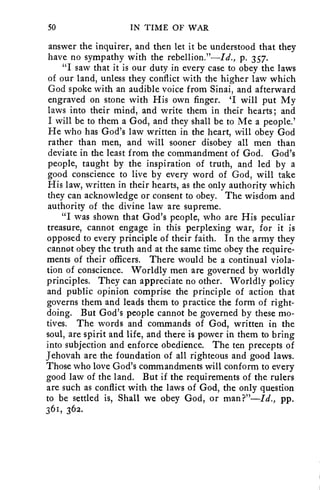
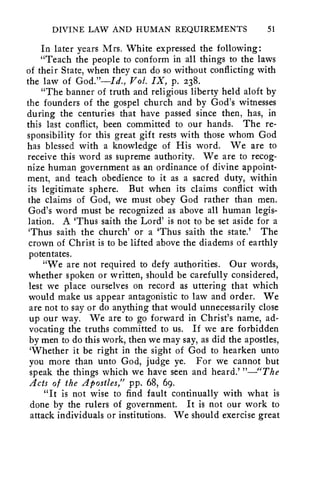
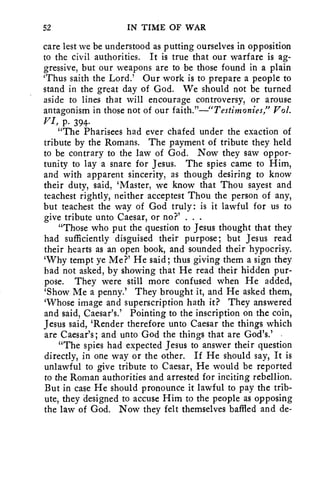
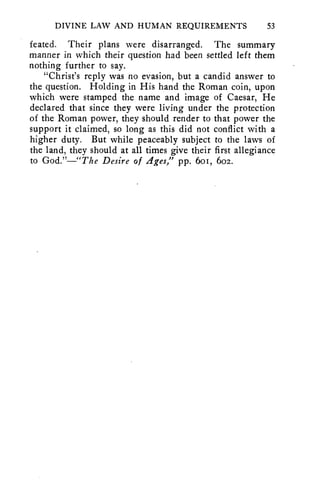
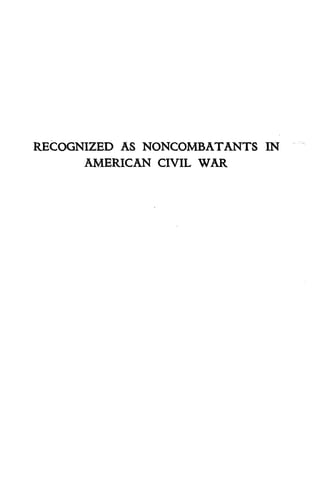
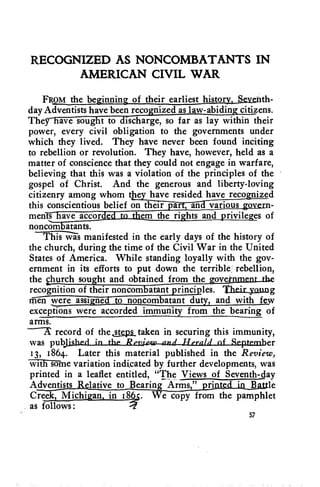
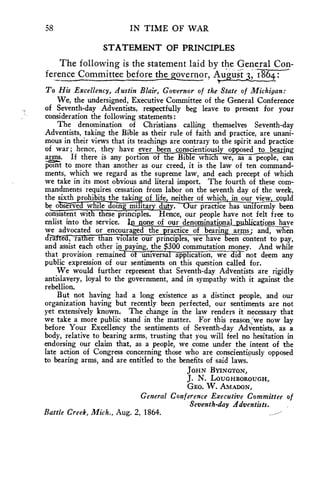
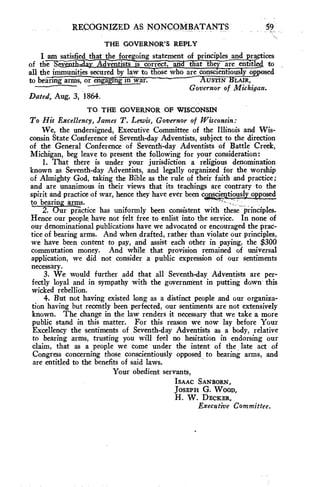
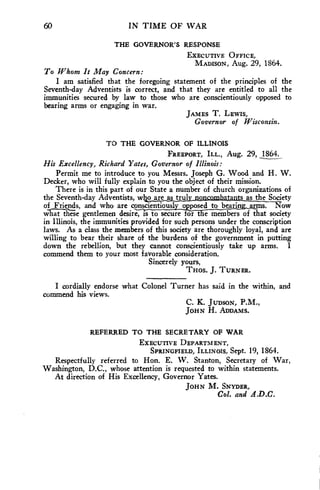
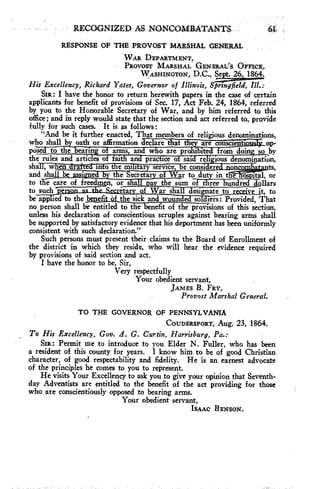
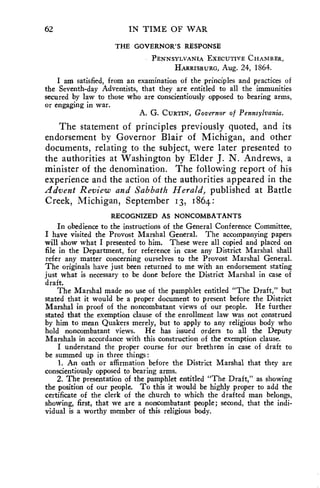
![RECOGNIZED AS NONCOMBATANTS 63
3. It may be proper to introduce the testimony of the drafted man's
neighbors, showing that his life has been consistent with this declaration
of his faith. I believe that this course of action, which is very plain
and simple, will meet the case of all our brethren, and will enable them
to avail themselves of the provisions of the exemption clause.
(Signed) J. N. ANDREWS.
Washington, D.C., Sept. 1, 1864.
The following are the papers above referred to:
MICHIGAN MILITARY AGENCY,
[On E, near 7th Street North]
WASHINGTON, D.C., Aug. 31, 1864.
Brig. Gen. James B. Fry, Provost Marshal General:
SIR : Permit me to ask your special attention to the bearer, Rev. J. N.
Andrews, a minister of the Religious Organization known and recognized
as the "Seventh-day Adventists," a body of Christians, residing in small
numbers in each, or nearly all, of the Free States, who "are conscientiously
opposed to the bearing of arms, and who are prohibited from doing so,
by the rules and articles of faith and practice of such religious denomina-tion."
Rev. J. N. Andrews comes duly accredited as the agent of that organ-ization
to ask of you that the relief contemplated in Section 17 of the
enrollment act, approved March 3, 1863, may be extended to each and
every member of their organization, provided they shall on oath, or affir-mation,
declare that "they are conscientiously opposed to the bearing of
arms, and are prohibited from doing so by the rules and articles of faith
and practice of their church, and furnish satisfactory evidence that their
deportment has been uniformly consistent with such declaration."
Permit me to ask your attention to the endorsement of Austin Blair,
Governor of Michigan, on page 9 of the accompanying pamphlet named
"The Draft," also to express to you my full confidence in the loyalty
and patriotism of the petitioners.
Your obedient servant,
J. TUNNICLIFF, JR.,
Michigan Military Agent.
WASHINGTON, D.C., Aug. 30, 1864.
SIR: I have the honor to present the accompanying Documents, showing
that I am the duly accredited representative to the Provost Marshal
General, of the religious denomination styled Seventh-day Adventists, a
people unanimously loyal and antislavery, who because of their views of
the ten commandments and of the teaching of the New Testament cannot
engage in bloodshed, and who therefore ask that the provisions of the](https://image.slidesharecdn.com/itow1936-141101060711-conversion-gate02/85/Seventh-day-Adventists-in-Time-of-War-54-320.jpg)
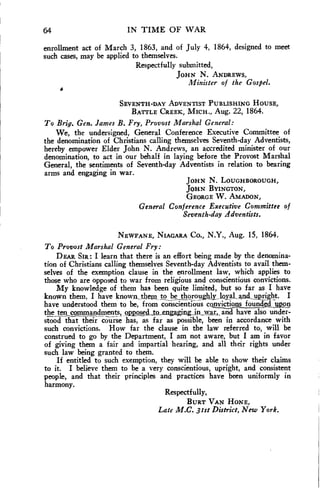
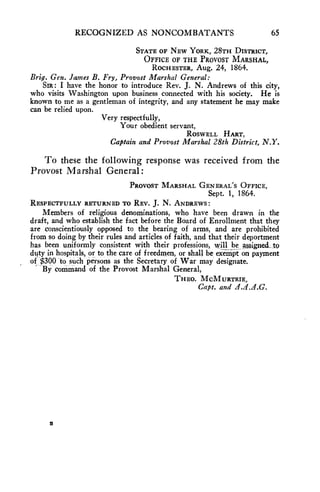
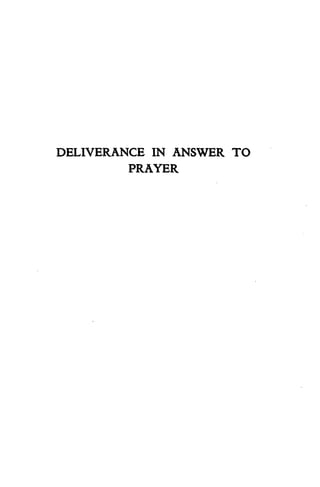
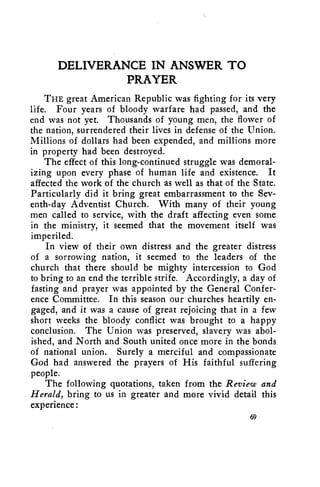
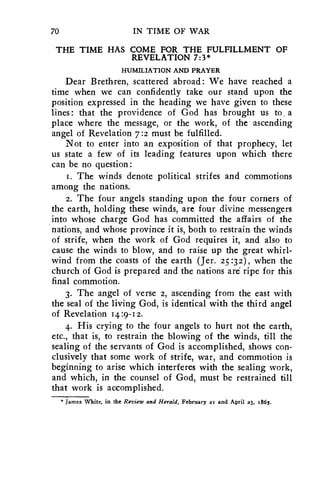
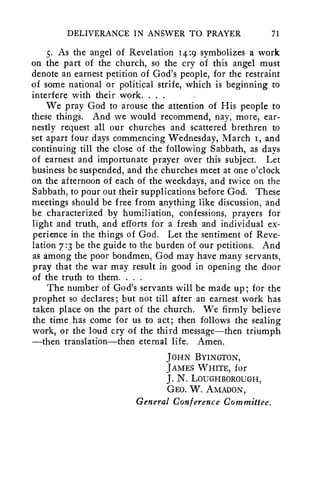
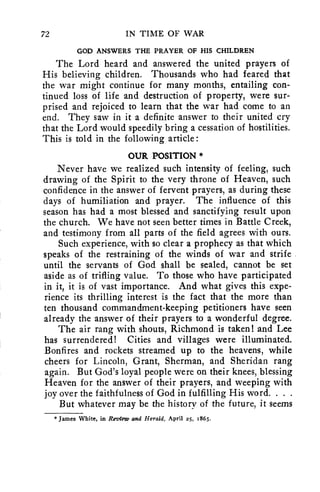
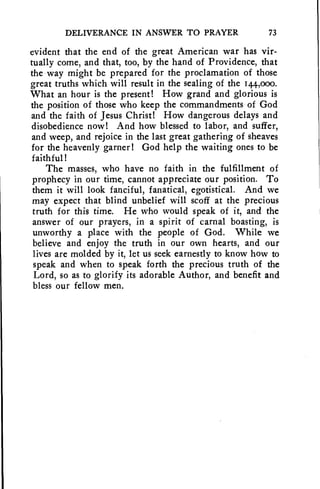
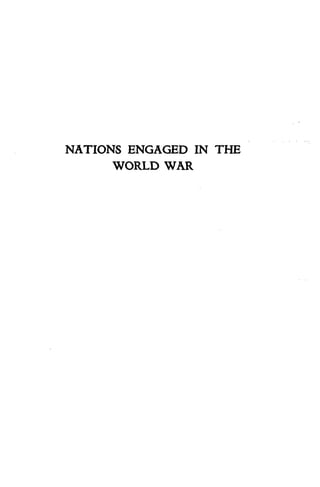
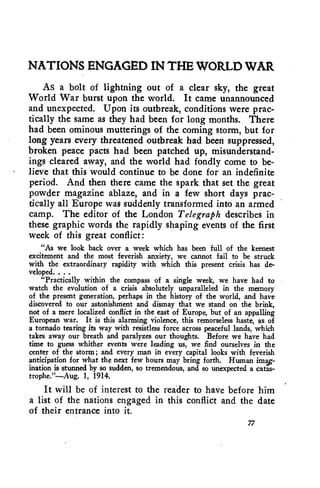
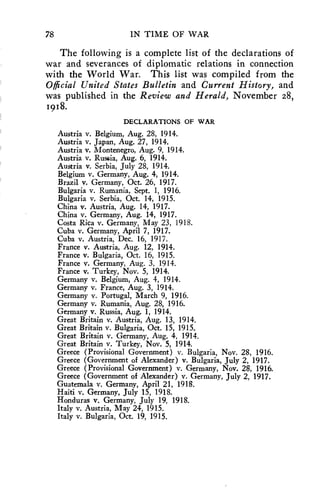
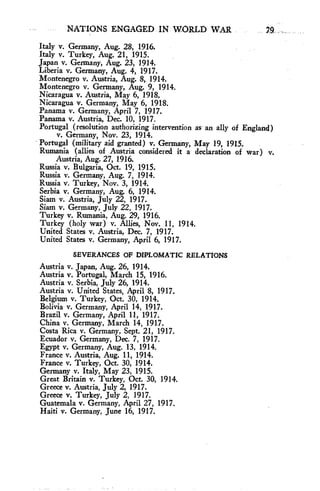
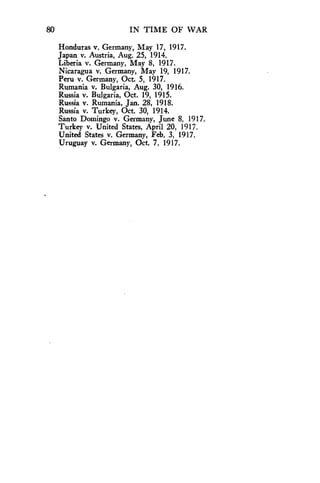
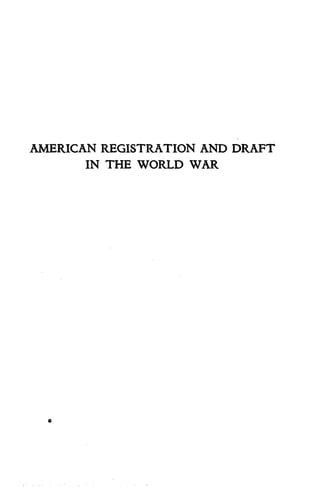
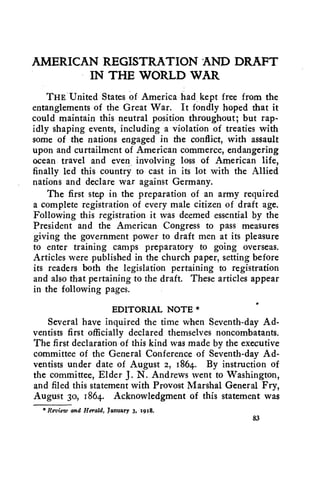
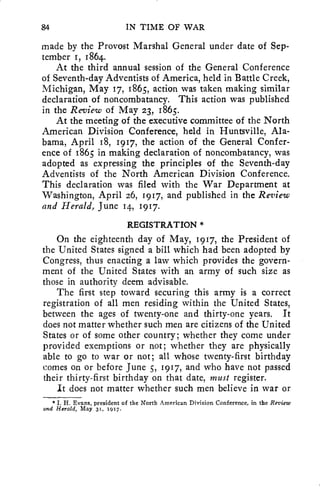
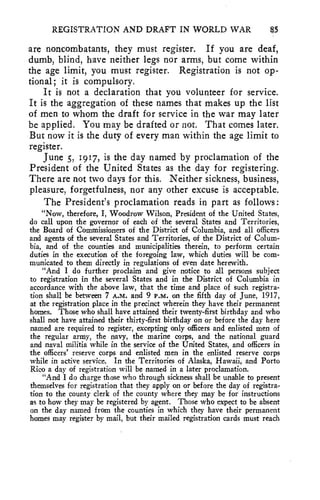
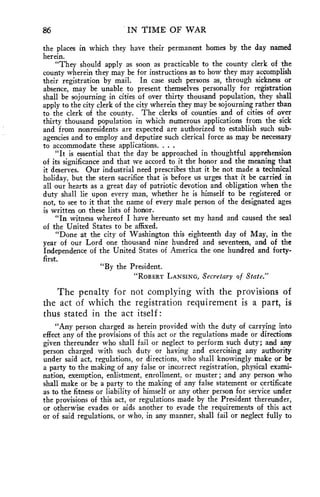
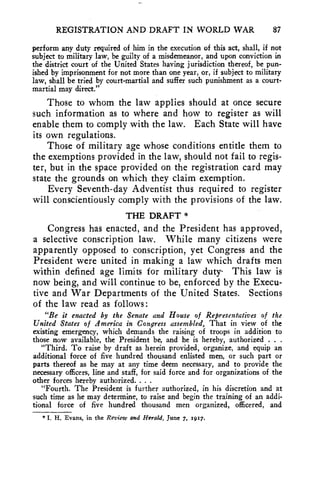
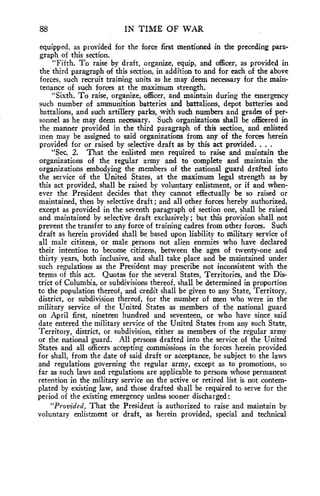
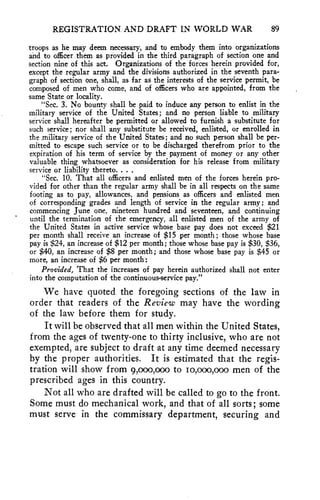
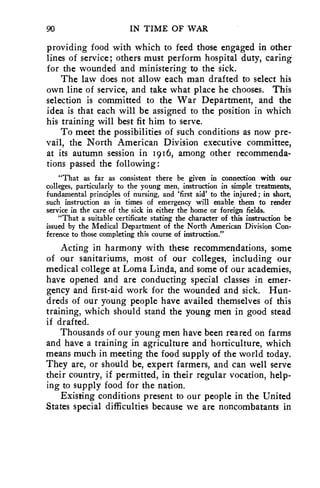
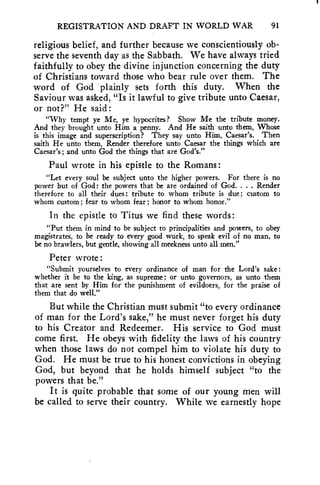
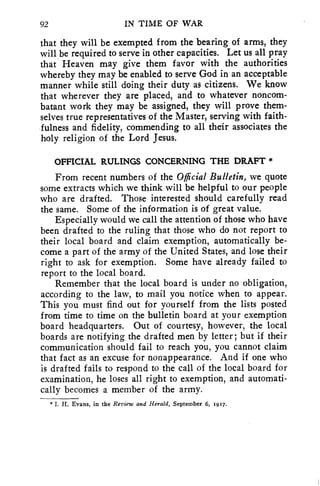
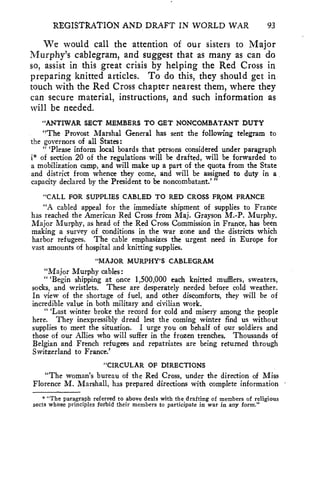
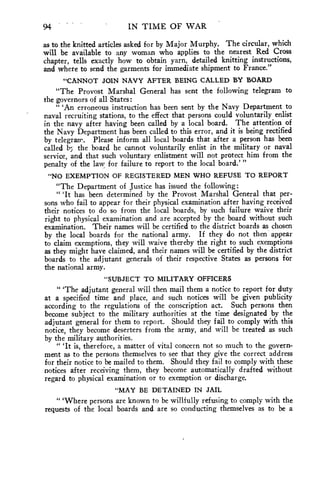
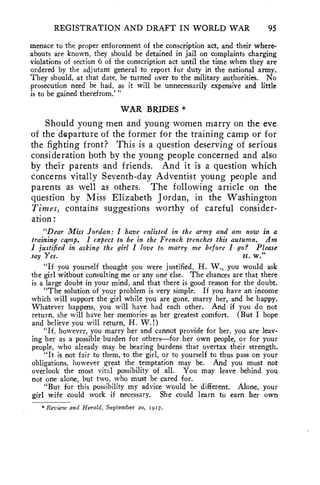
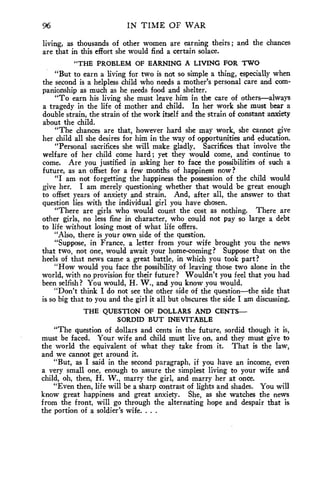
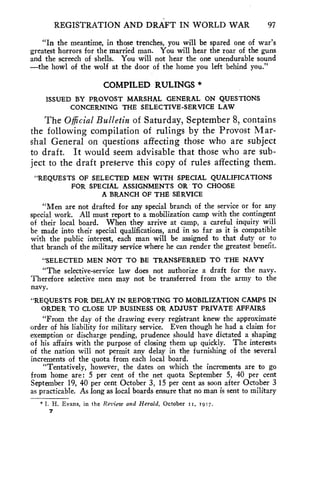
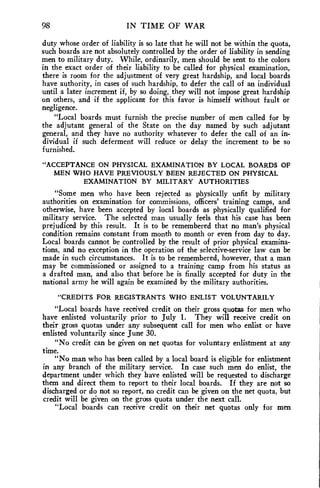
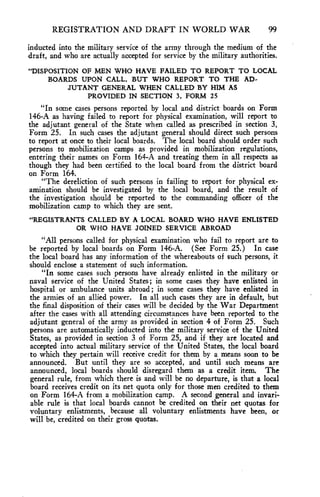
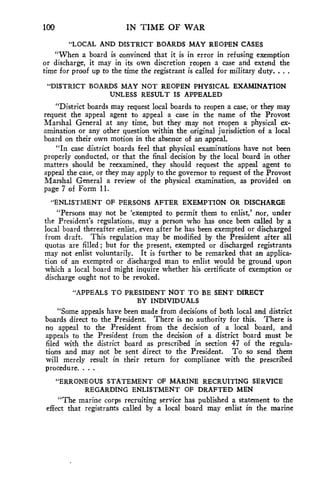
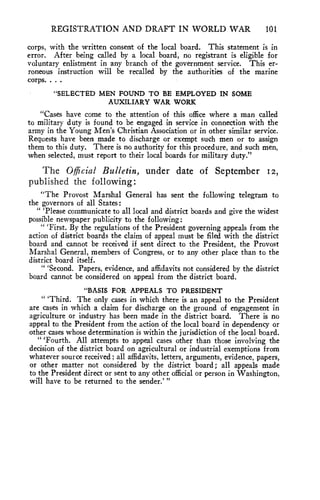
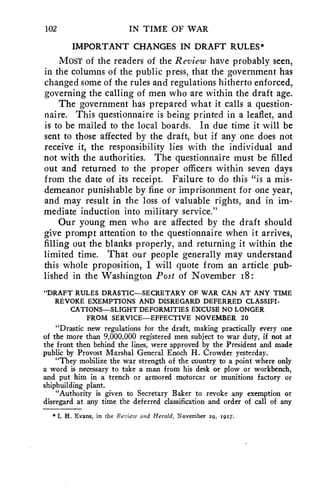
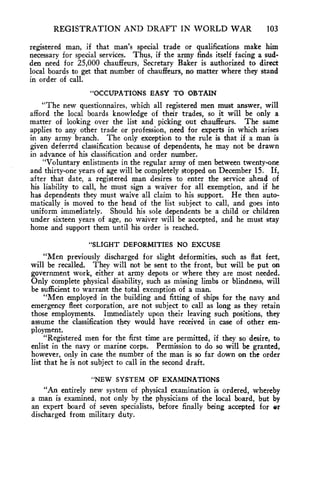
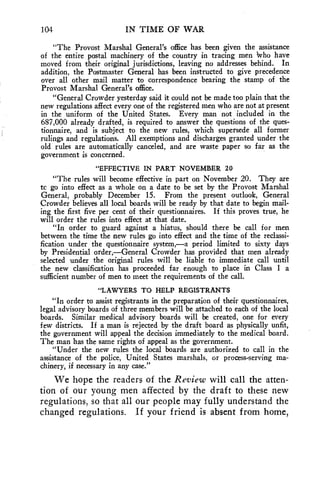
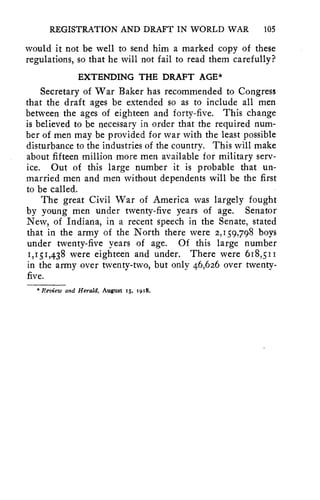
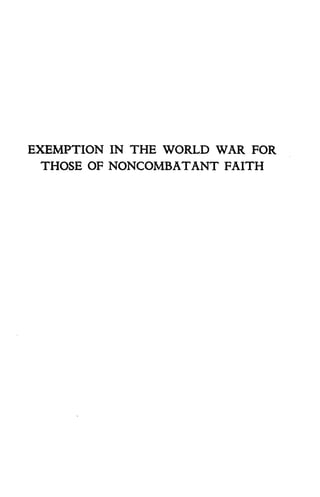
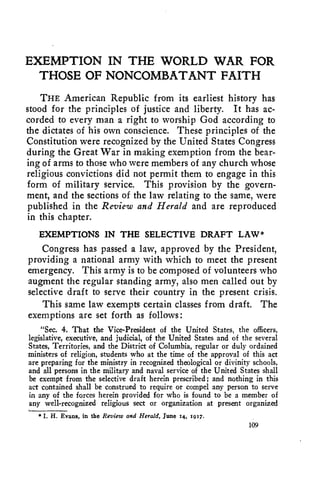
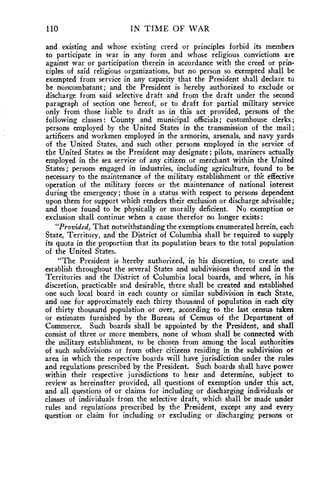
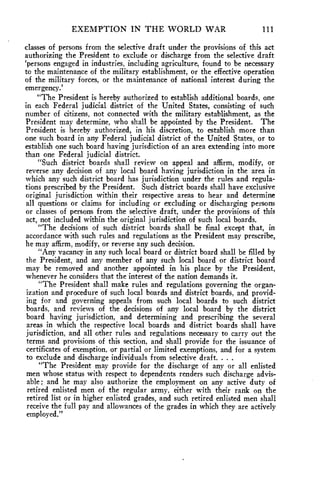
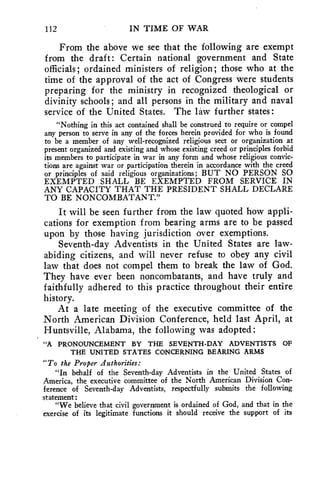
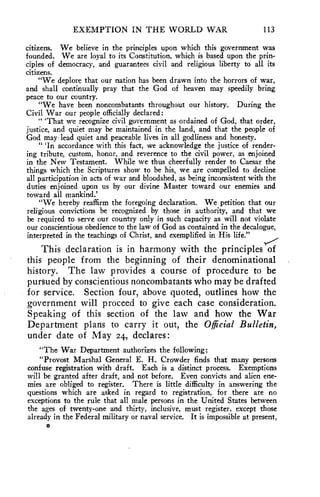
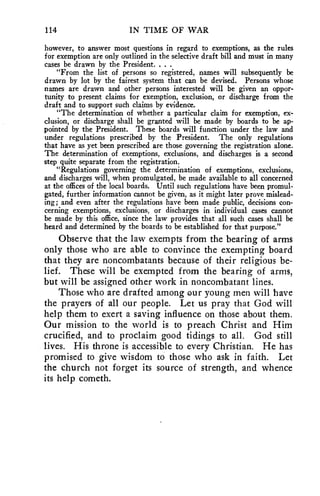
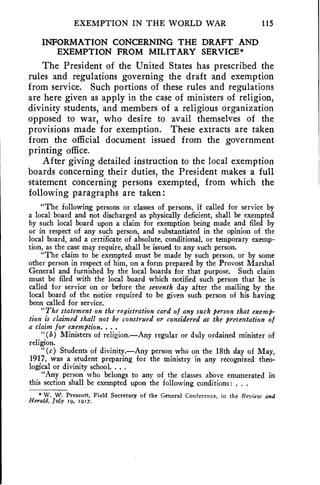
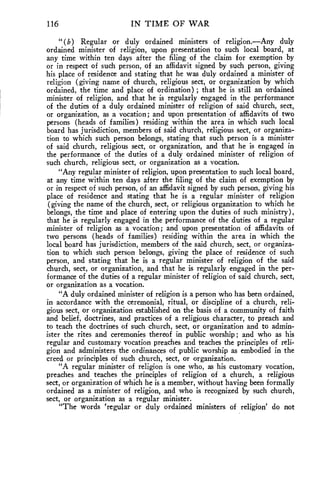
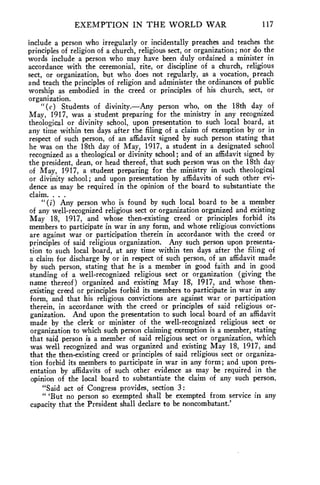
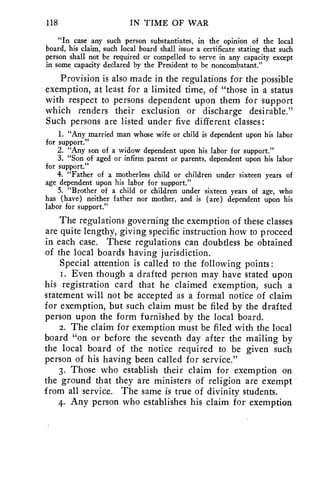
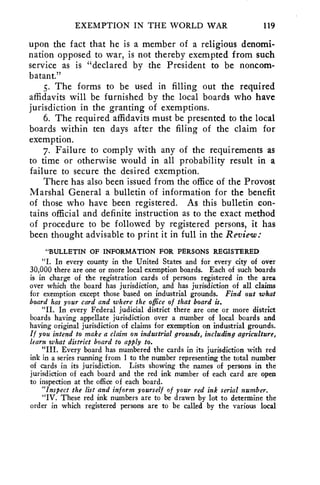
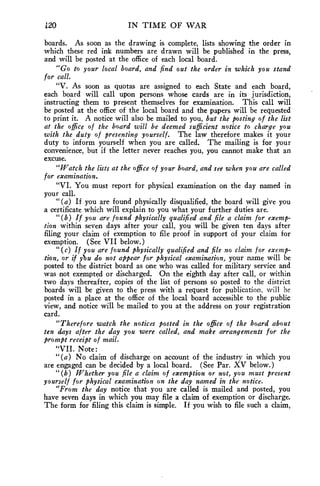
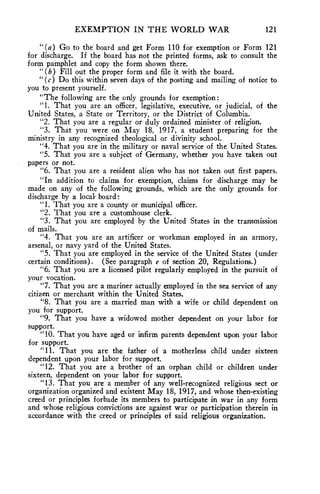
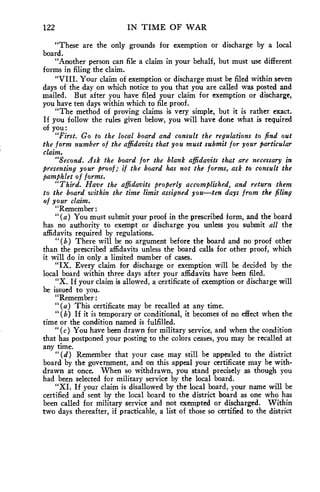
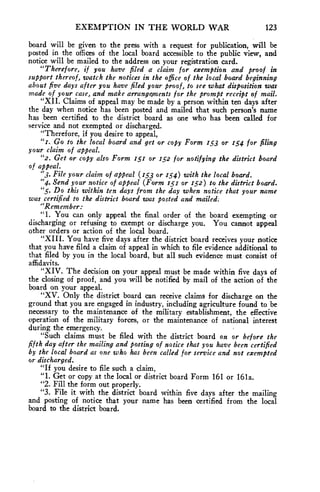
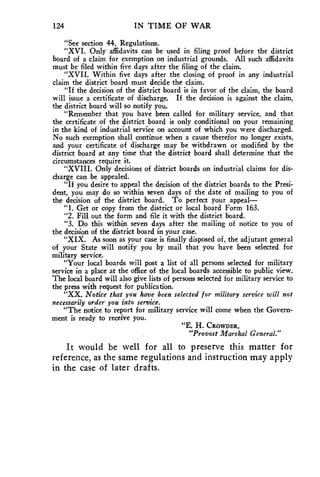
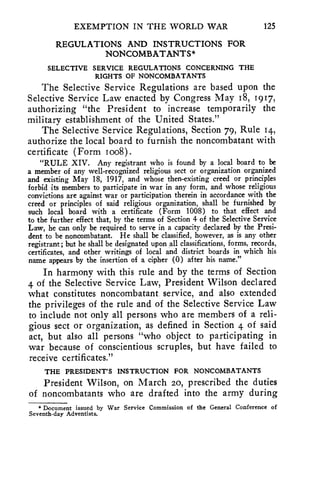
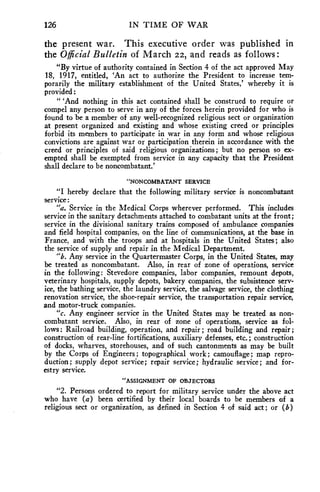
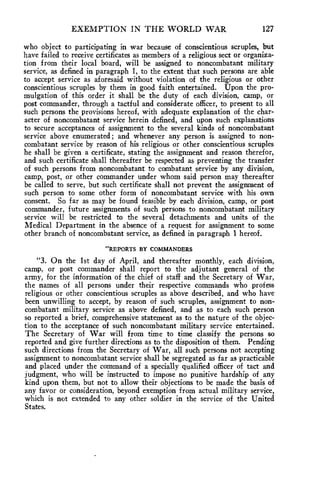
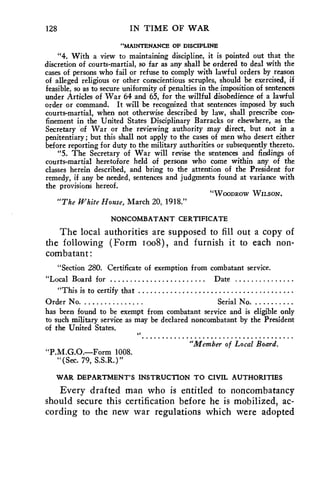
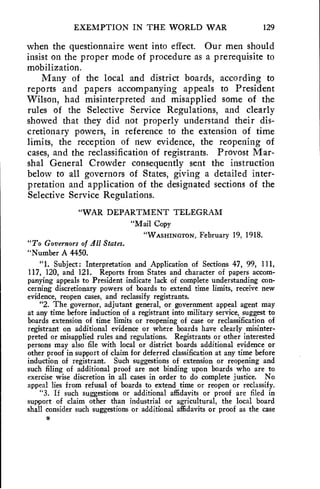
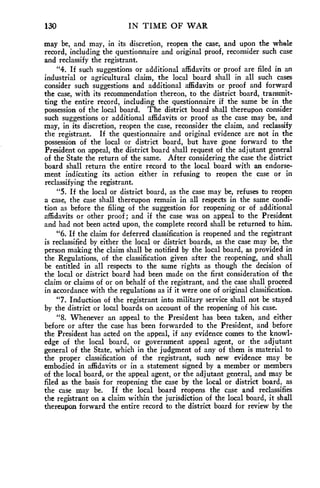
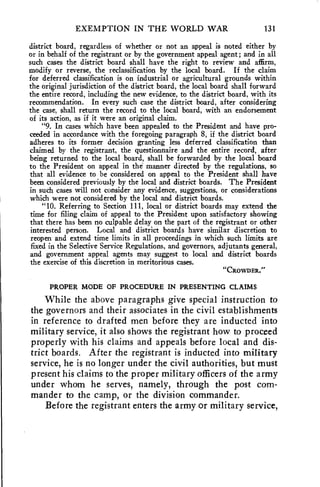
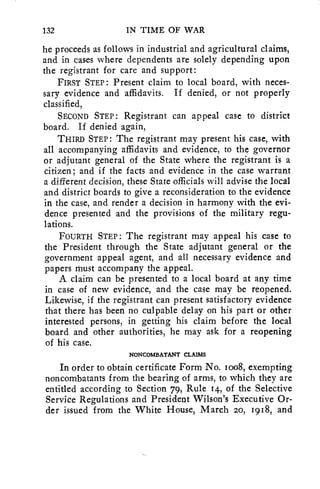
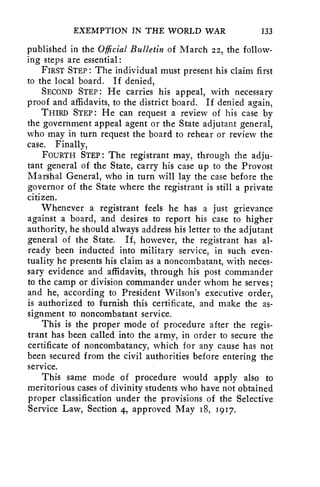
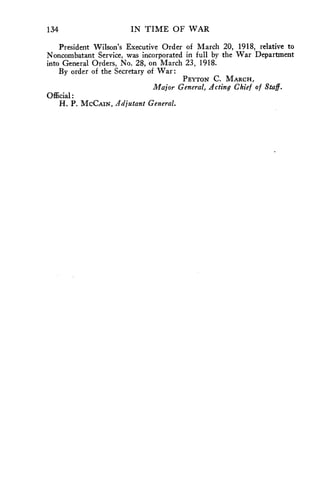
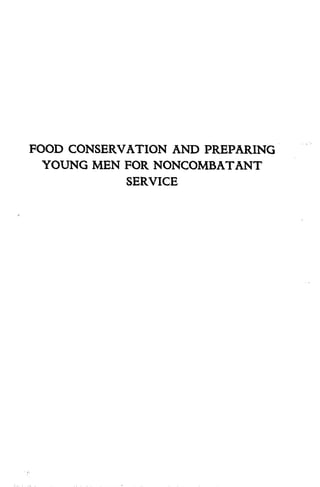
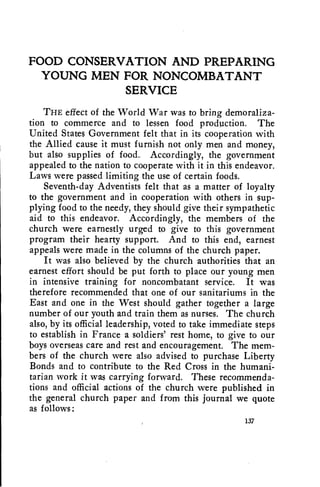
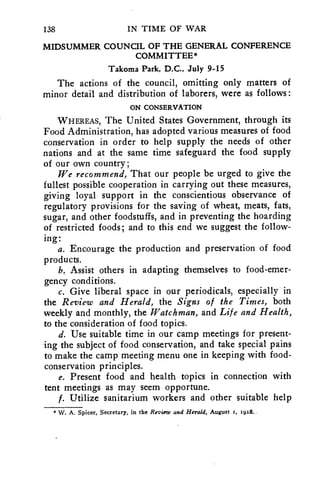
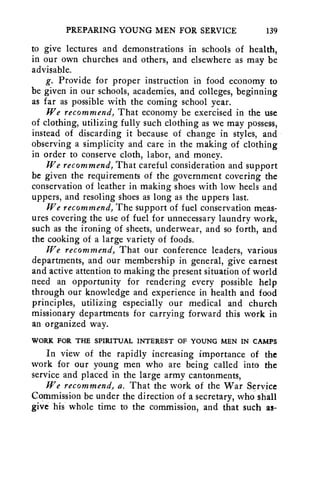
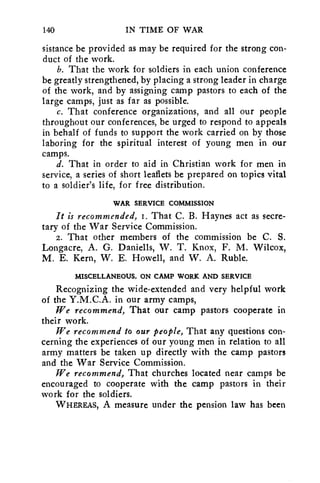
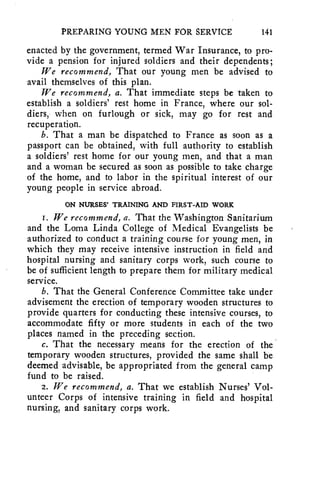
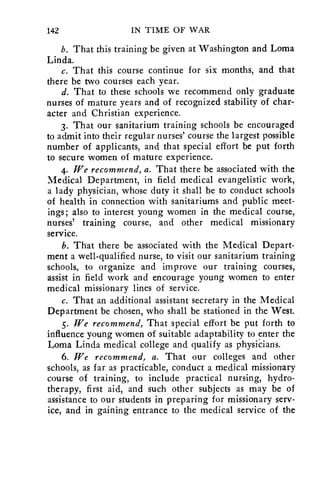
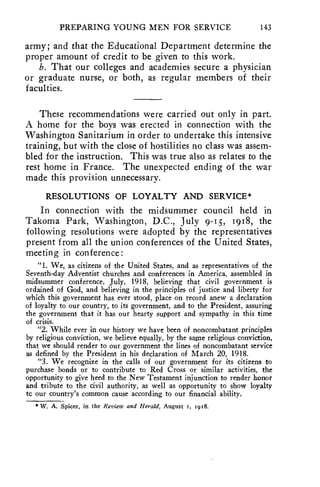
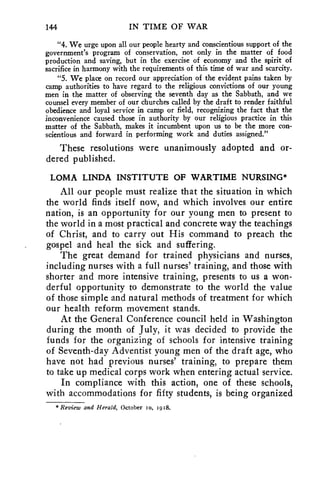
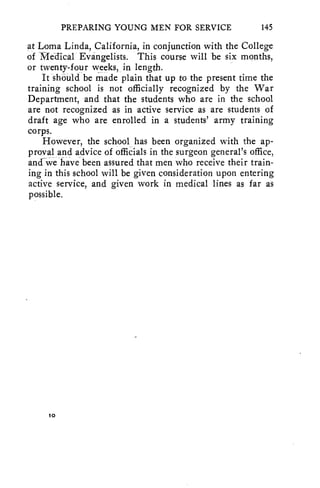
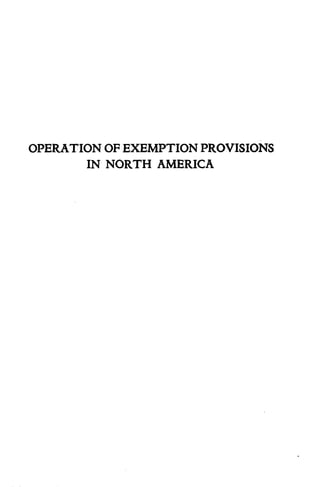
![OPERATION OF EXEMPTION PROVISIONS
IN NORTH AMERICA
How did the law of exemption operate in the field?
Were our youth who were entitled to exemption from the
bearing of arms accorded this status by the government?
We are glad to reply that they were, under most cir-cumstances.
Their difficulty in securing exemption came
usually through the misunderstanding of petty officers who
did not understand the law or who were jealous of their
authority. The higher army officers were uniformly liberal
in their interpretation of the exemption provision, and
whenever appeal was made to the War Department at
Washington, it received that considerate treatment which
the merits of the particular case warranted.
The following statement from one appointed to look
after this particular work for the Seventh-day Adventist
youth, has been prepared especially for publication in this
chapter. Other articles are reproduced from the church
paper.
NONCOMBATANCY IN THE UNITED STATES DURING
THE WORLD WAR*
EXPERIENCES OF SEVENTH-DAY ADVENTIST YOUNG MEN WHO
WERE DRAFTED INTO THE WAR SERVICE
The President's definitions and regulations [as set forth
in previous chapters] governing noncombatant service were
well considered and gave ample protection to all drafted
men who held conscientious scruples against combatant
service in the army or navy. The President of the United
States, the Secretary of War, the Secretary of the Navy,
* By ,,,S.,.Longacre; who-was el a.rg& of .the.War,Service..Welfare-Nork, and
was also appointed a member of the local advisers of the draft boards of Maryland
and the District of Columbia, by the governor of Maryland and the District of
Columbia commissioners, for the purpose of proper classification of drafted men
into the war service.
149](https://image.slidesharecdn.com/itow1936-141101060711-conversion-gate02/85/Seventh-day-Adventists-in-Time-of-War-130-320.jpg)
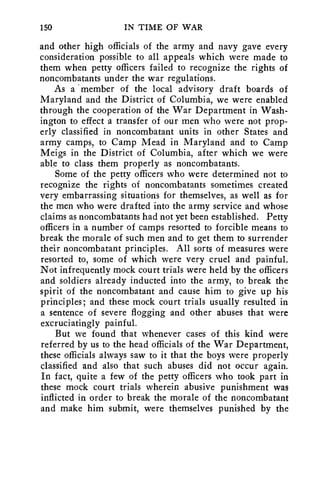
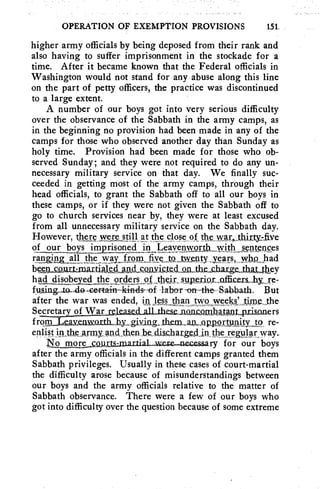
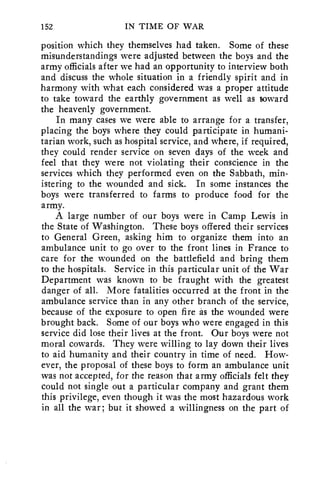
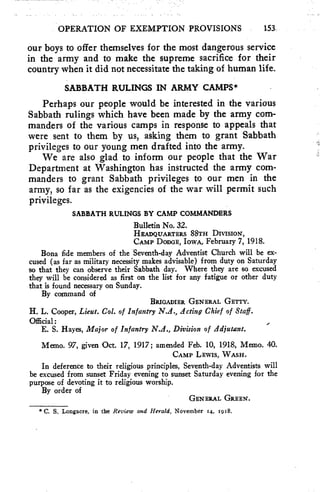
![154 IN TIME OF WAR
HEADQUARTERS 40TH DIVISION,
CAMP KEARNEY, CALIF., Feb. 12, 1918.
Concerning opportunity to be given Seventh-day Adventists in this
division, in order to allow them to engage in their religious duties. I
take pleasure in informing you that the necessary instructions have been
issued in accordance with your request. As all the men of your belief are
on duty at the Base Hospital, a copy of this letter I this day directed to
the Commanding Officer, Base Hospital, is enclosed for your information.
[Signed] F. S. STRONG,
Major General U.S.A.
(Copy of Letter)
From: The Division Adjutant.
To: The Commanding Officer, Base Hospital, Camp Kearney.
Subject: Seventh-day Adventists to be excused from duties on Saturdays.
The Commanding General directs me to inform you that hereafter
any Seventh-day Adventists, who may be on duty at the Base Hospital,
should be excused from all duties not absolutely necessary, in order to
allow them to engage in religious duties from sunset Friday until sunset
Saturday afternoon.
[Signed] L. C. MATTHEWS,
Major of Infantry, Division Adjutant.
HEADQUARTERS 83D DIVISION NATIONAL ARMY,
CAMP SHERMAN, CHILLICOTHE, OHIO, Feb. 19, 1918.
I beg leave to inform you that each organization commander at this
camp will at all times offer every possible opportunity for the members
of his command to engage in their religious duties, upon proper presentation
of the facts to him.
[Signed] FREDERICK PERKINS,
Brigadier General, Commanding.
HEADQUARTERS, CAMP SHERMAN,
CHILLICOTHE, OHIO, Oct. 12, 1918.
As you know, the practice of not requiring men of your church to
work on Saturdays has existed right along under my administration.
[Signed] T. R. RIVERS,
Brigadier General, Commanding.
The following was published to the Assembled Adju-tants
about February 25, 1918:
HEADQUARTERS 76TH DIVISION,
CAMP DEVENS, AYER, MASS.
Memorandum for the Division Adjutant:
1. Letters have been written to the last employers of the above-named
men as to whether or not they worked on Saturdays for said em-ployers.
Answers are now being awaited.](https://image.slidesharecdn.com/itow1936-141101060711-conversion-gate02/85/Seventh-day-Adventists-in-Time-of-War-135-320.jpg)
![OPERATION OF EXEMPTION PROVISIONS 155
2. I recommend, should the Commanding General so see fit, that these
men be granted from sunset Friday till sunset Saturday inspection and
tests, as it would be most impractical to have special days set for the
inspection and tests of these men.
3. I further recommend that Organization Commanders, having Sev-enth-
day Adventists in their commands, be instructed to grant such men
the above liberty, but require them to make up, on Sundays, any work
which might have fallen to their lot to have been performed on Saturdays.
[Signed] W. H. NEILL,
Major of 3o3d Infantry, Acting Division Inspector.
Approved by Commanding General.
CAMP FUNSTON, KANSAS, March 9, 1918.
Seventh-day Adventists in this command will be excused from all.
duties Saturdays, in order to allow them to engage in religious duties,
and will be given passes to visit Manhattan on Saturday afternoons, for
the purpose of attending services, providing their conduct justifies a pass.
By command of
BRIGADIER GENERAL WINN.
HEADQUARTERS 84TH DIVISION,
CAMP ZACHARY TAYLOR, KY., March 26, 1918.
General Hale directs me to inform you that religious feeling and
liberty of conscience has always been carefully considered in the adminis-tration
of his cantonment. Members of your faith who apply through
official channels for authority to be excused from duty for the purpose of
allowing them to engage in religious duties on Saturday, may be sure
that their request will receive due consideration.
[Signed] 0. W. KINSWALD,
Captain of Infantry
The following order was published March 9, 1918:
HEADQUARTERS 87TH DIVISION NATIONAL ARMY,
CAMP PIKE, ARK., May 6, 1918.
Bona fide members of the Seventh-day Adventist Church will be
excused (as far as military necessity makes advisable) from duty on
Saturday, so that they can observe their Sabbath day. Where they are
excused, they will be considered as first on the list for any fatigue or
other duty that is found necessary on Sunday.
[Signed] A. F. HARRIS,
Captain of Field Artillery, Aide-de-Camp.
HEADQUARTERS, FORT SNELLING, MINN., June 12, 1918.
It is my desire to arrange the work of the various men so there will
not be any conflict with their religious beliefs or principles. I can assure](https://image.slidesharecdn.com/itow1936-141101060711-conversion-gate02/85/Seventh-day-Adventists-in-Time-of-War-136-320.jpg)
![156 IN TIME OF WAR
you that there will be no pressure brought to bear upon which would
cause him to violate his conscience by necessitating him to do labor on his
Sabbath day.
[Signed] A. L. PARMERTER,
Colonel of 36th Infantry, Commanding.
General Orders No. 5.
HEADQUARTERS PORTO Rico TRAINING CAMP,
CAMP LAS CASAS, P.R., July 30, 1918.
I. Bona fide members of the Seventh-day Adventist Church will be
excused (as far as military necessity makes advisable) from duty on Sat-urday,
so that they can observe their Sabbath day. When they are so
excused, they will be considered as first on the list for any fatigue or
other duty that is found necessary on Sunday.
By order of
COL. O. P. TOWNSHEND.
NADAL, Major of 373d Infantry, N.A., Adjutant.
Bulletin No. 24.
POST HEADQUARTERS, FORT SILL, OKLA., Aug. 24, 1918.
II. Bona fide members of the Seventh-day Adventist Church will be
excused (as far as military necessity makes it advisable) from duty on
Saturday, so that they can observe their Sabbath day. Where they are so
excused, they will be considered as first on the list for any fatigue or
other duty that is found necessary on Sunday.
By command of
BRIGADIER GENERAL PLUMMER.
JOHN J. LYNCH, Captain A.G.D., Adjutant.
Memorandum No. 179.
HEADQUARTERS, CAMP TRAVIS, TEX., Aug. 28, 1918.
III. Seventh-day Adventists.
Bona fide members of the Seventh-day Adventist Church will be ex-cused
(as far as military necessity makes advisable) from duty on Saturday,
so that they can observe their Sabbath day. Where they are so excused,
they will be considered as first on the list for any fatigue or other duty
that is found to be necessary on Sunday.
By order of
COLONEL FRIER.
[Signed] ROBERT M. BREARD, JR., Captain Adjutant.
HEADQUARTERS, CAMP LOGAN,
HOUSTON, TEX., Oct. 2, 1918.
Bona fide members of the Seventh-day Adventist Church are excused
from military duty, as far as military necessity makes it advisable, on
Saturday, so that they may observe their Sabbath day. Those who are](https://image.slidesharecdn.com/itow1936-141101060711-conversion-gate02/85/Seventh-day-Adventists-in-Time-of-War-137-320.jpg)
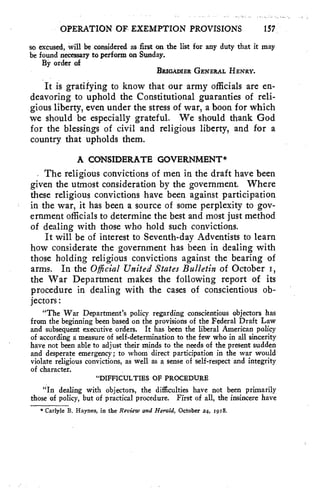
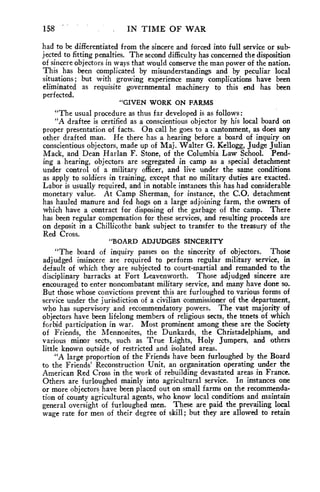
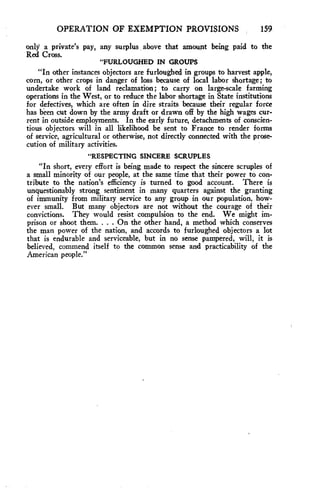
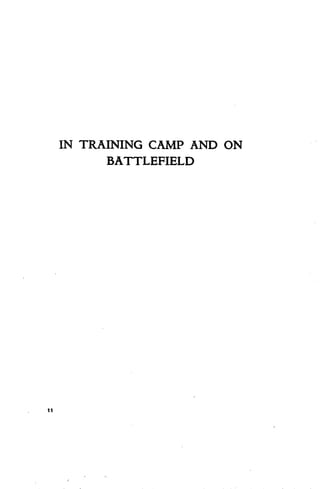
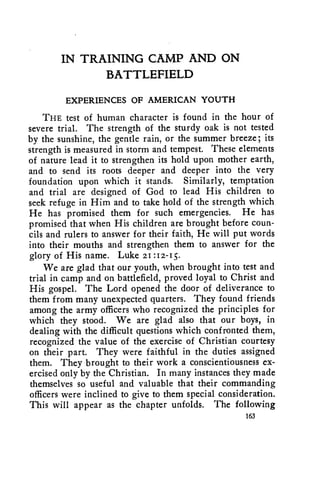
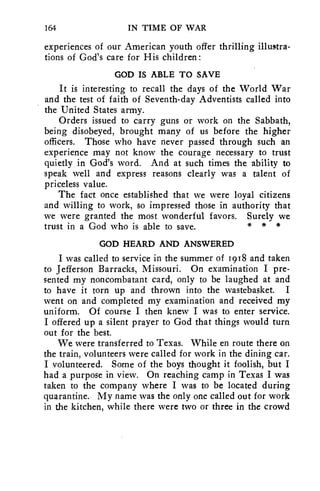
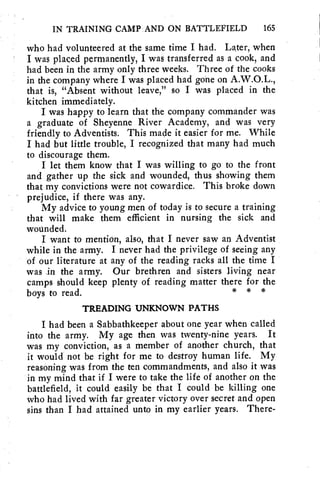
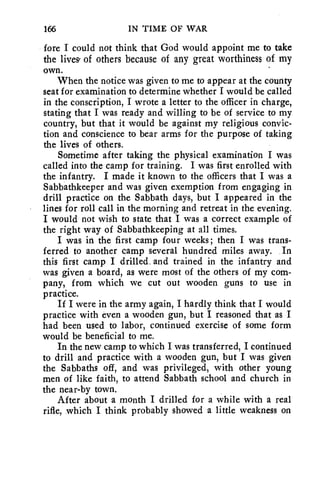
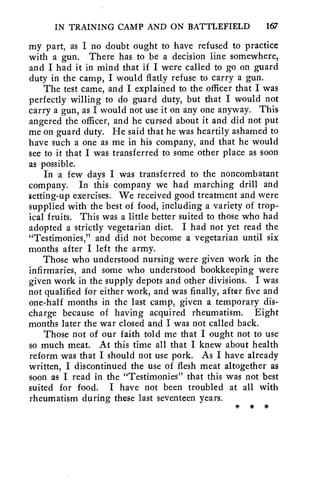
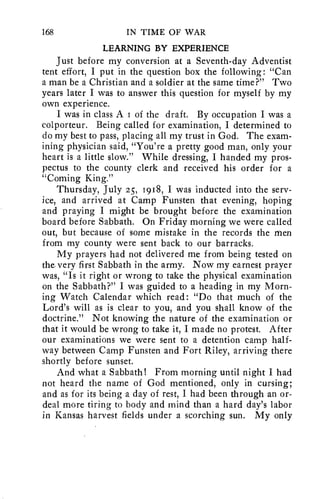
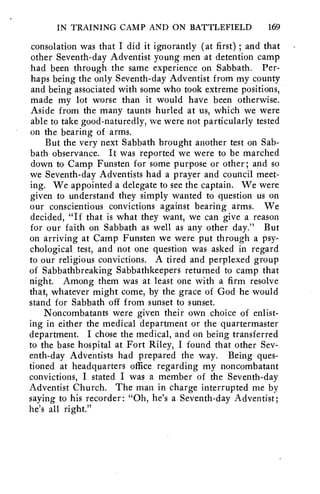
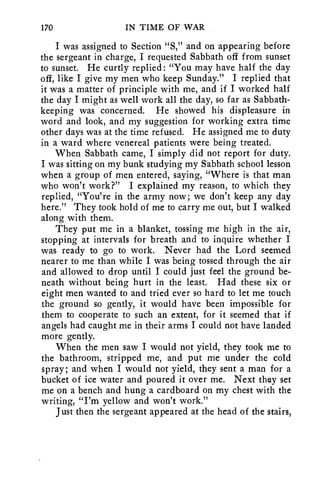
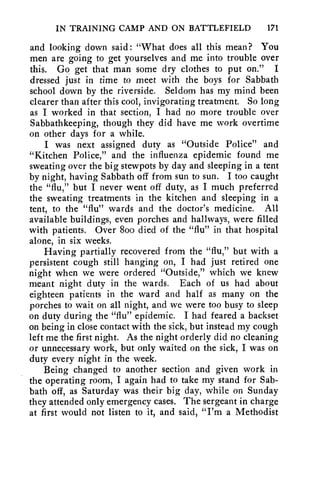
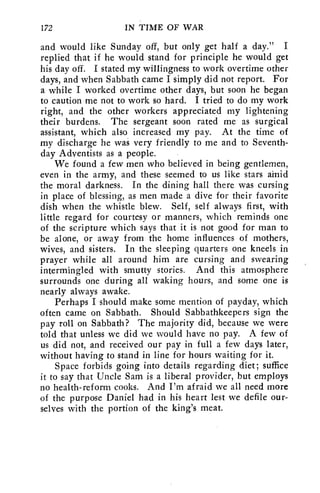
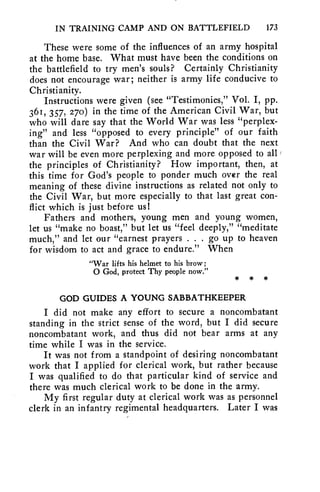
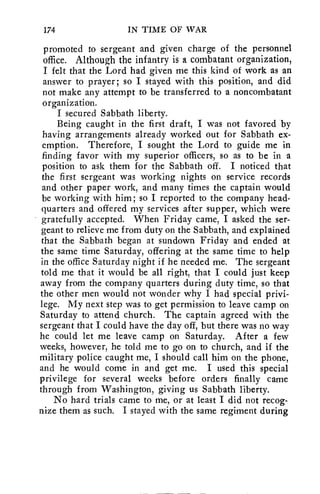
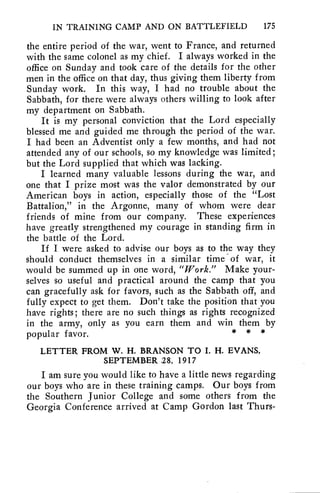
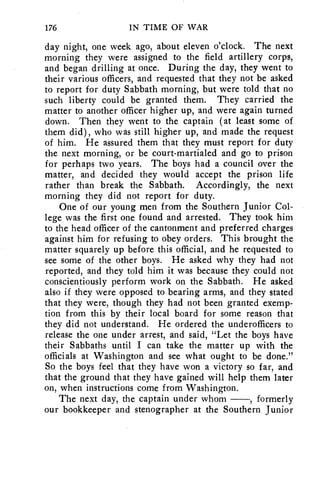
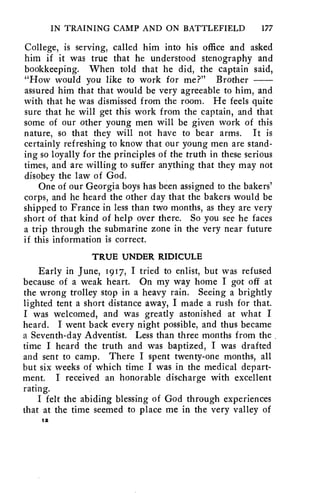
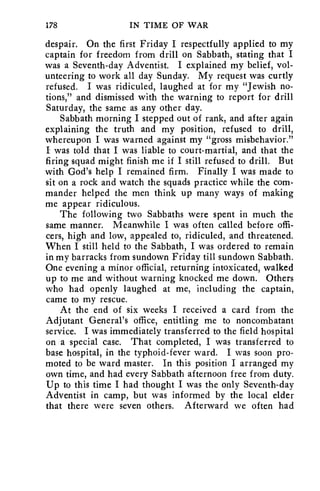
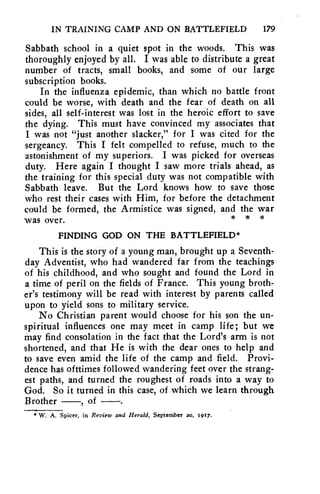
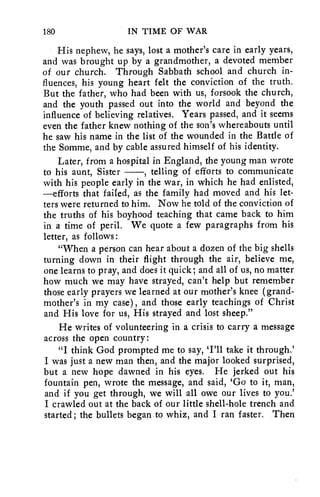
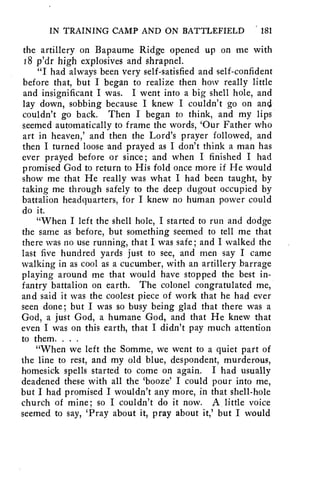
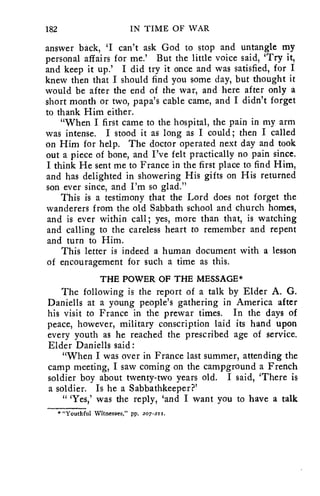
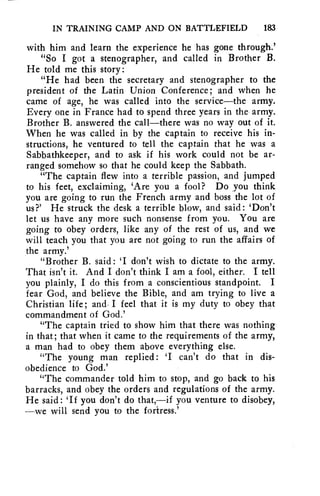
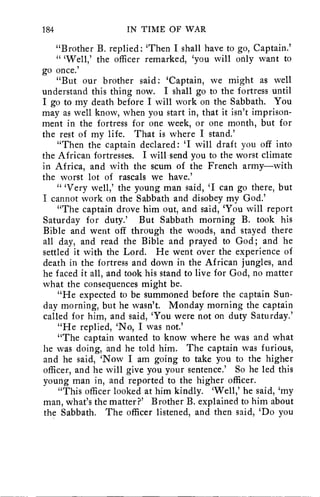
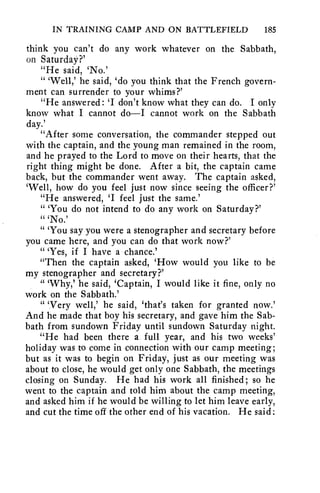
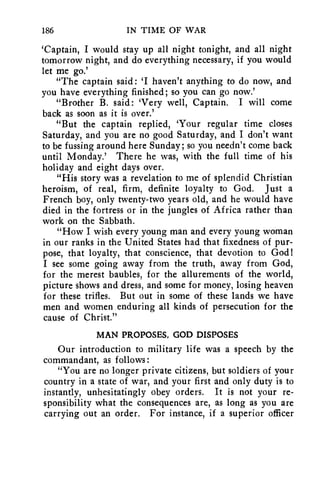
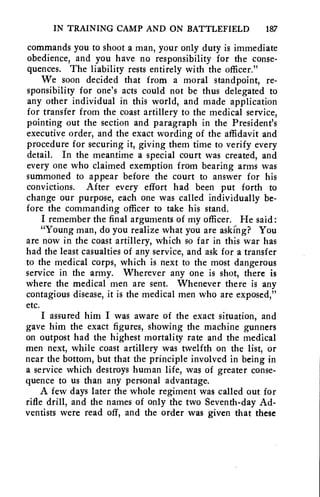
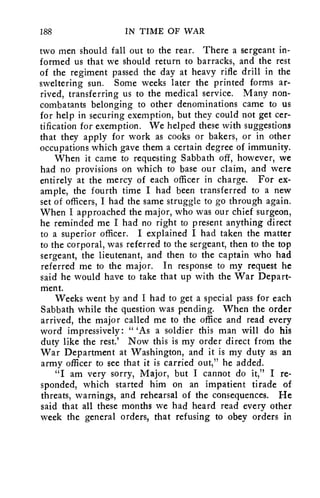
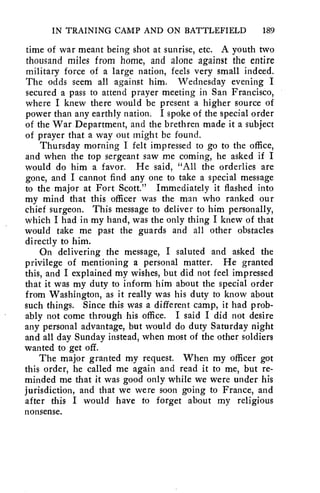
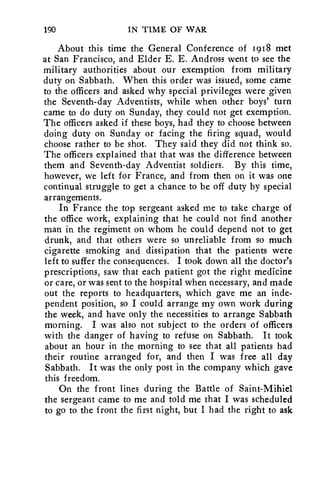
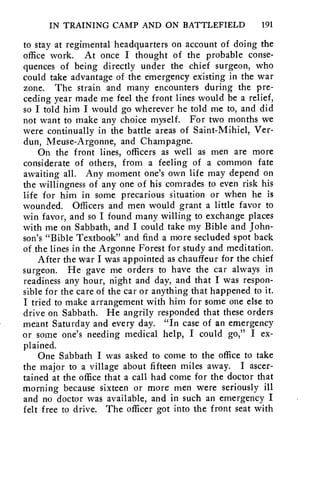
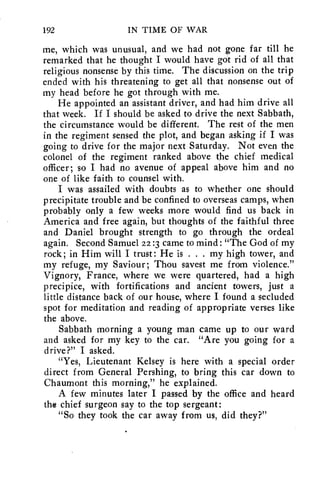
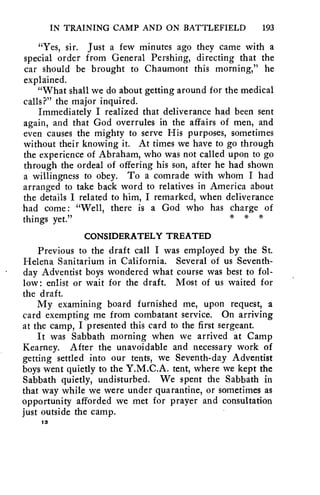
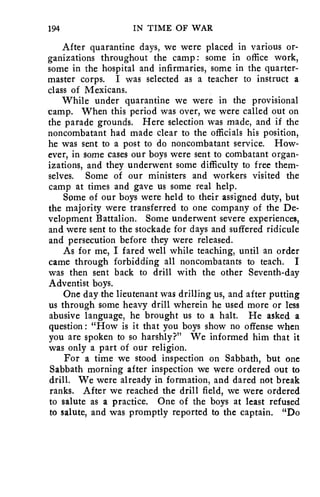
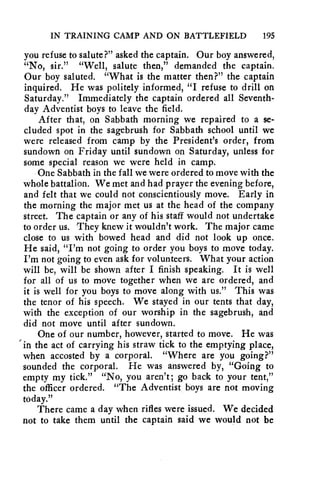
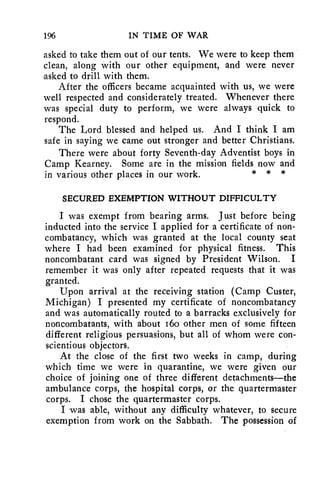
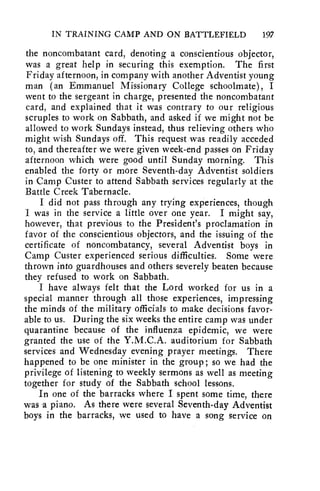
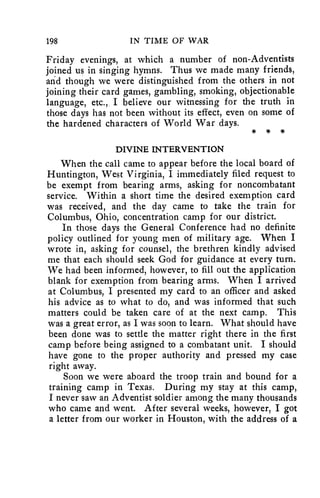
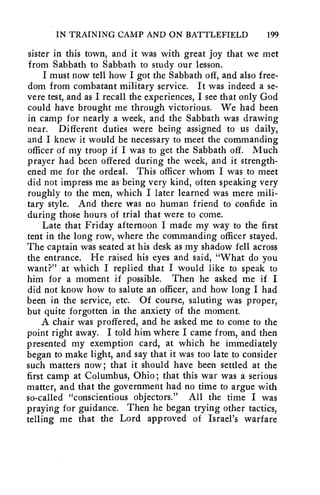
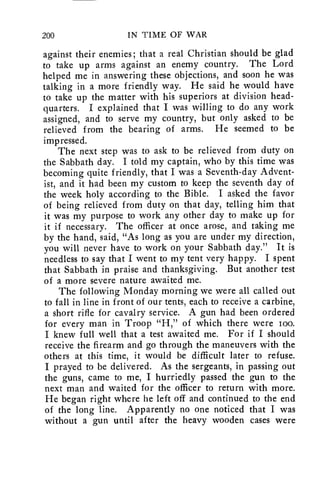
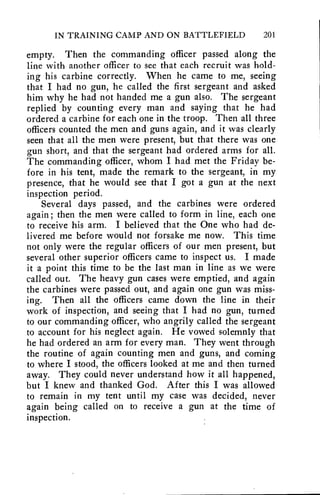
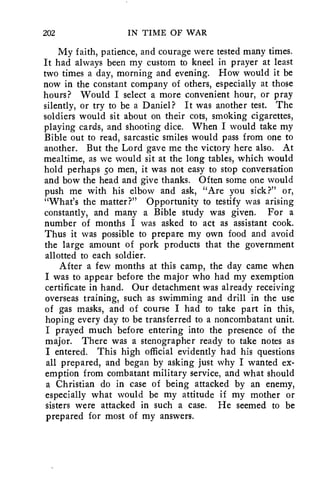
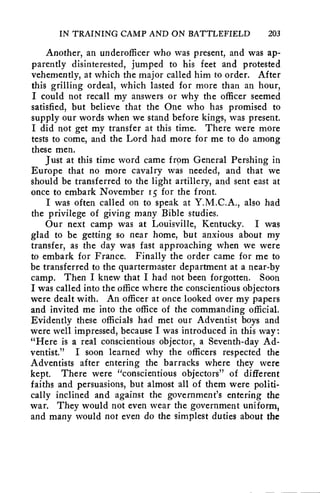
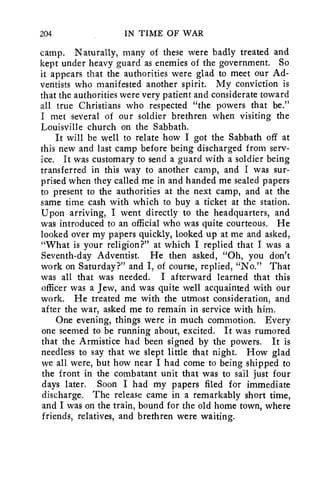
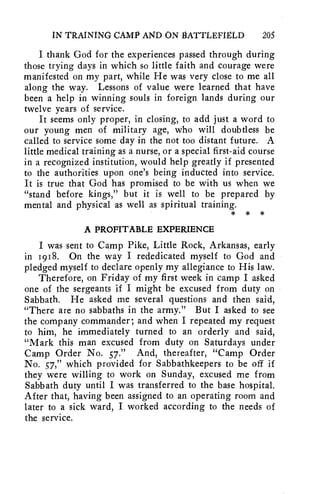
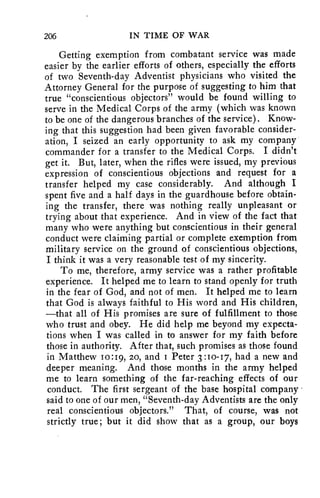
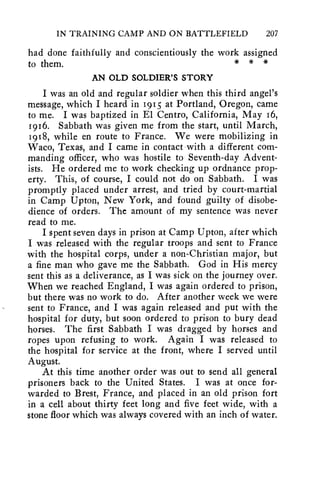
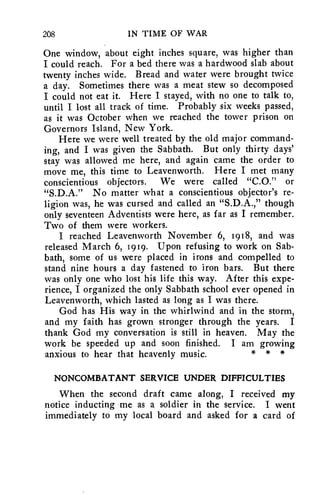
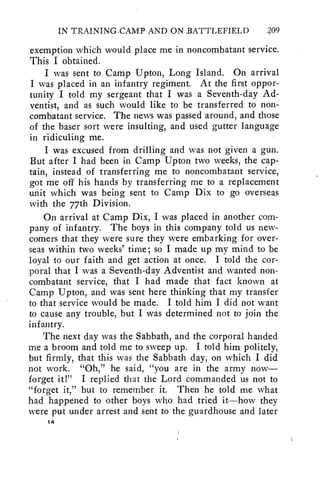
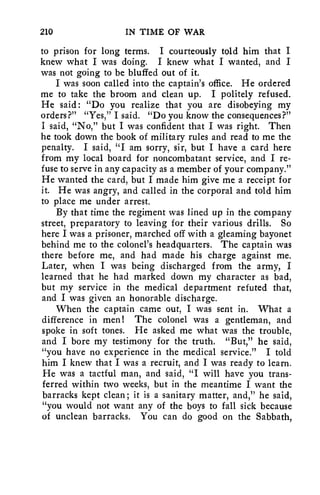
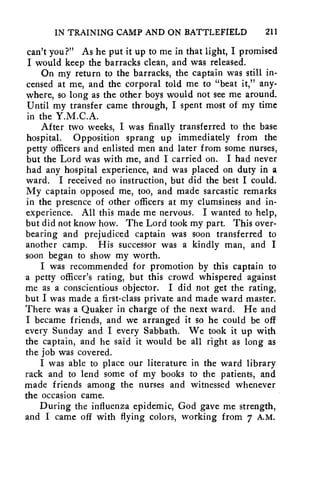
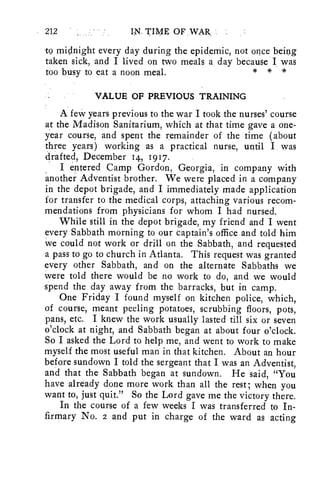
![IN TRAINING CAMP, AND ON BATTLEFIELD 43
sergeant. I found the duties there almost the same as sani-tarium
work. I could so manage my work in preparation
for Sabbath that I had only nominal duties, getting every
other Sabbath entirely off. Soon I was given as assistant
another Adventist, who is now a graduate of Loma Linda,
and we divided our duties.
Sometime in July I received my warrant as real medi-cal
sergeant, and was later offered opportunity to go to
another camp for a few months' instruction, in line for
promotion to first lieutenant medical; but upon investiga-tion
I concluded I would not be able to keep the Sabbath
without much friction, so rejected the promotion, and was
discharged December 24, 1918.
In our camp there was a group of young men [not
Adventists] who refused at the base hospital to give a glass
of water to a sick boy or do anything at all. This stand
caused them a great deal of trouble. * * *
THE WAY PROVIDENTIALLY PREPARED
On May 25, 1918, I left New York City on a troop
train bound for Camp Hancock, Georgia, after having been
in the truth only two months, but I had learned that I
should seek noncombatant service when called to the col-ors.
During the three days' journey the foremost thought
in my mind was what should I do when called to bear
arms, and I prayed; that was all I could do. And as I
look back through the years, I see clearly that my heavenly
Father helped me through that time of six months in camp.
Here is the story:
For over a week the officers did not get around to have
the company settled with uniforms or duties; all of us
boys were just lying around idle, and as for me, I was rest-less
and wanted exercise. One day I saw a fellow carrying
cooking pots into the kitchen from the field range just out-](https://image.slidesharecdn.com/itow1936-141101060711-conversion-gate02/85/Seventh-day-Adventists-in-Time-of-War-192-320.jpg)
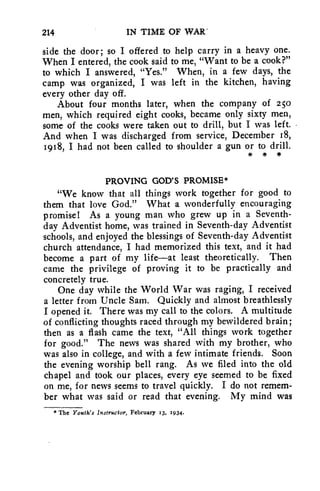
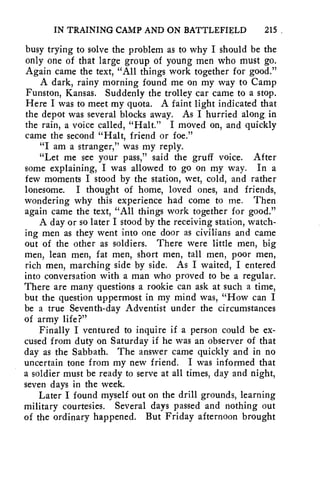
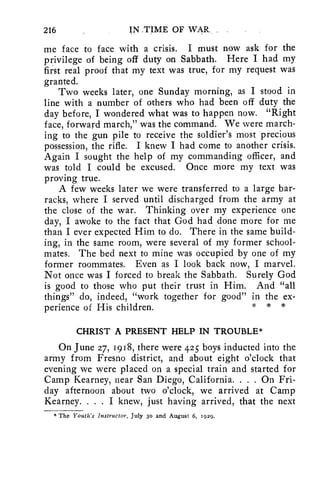
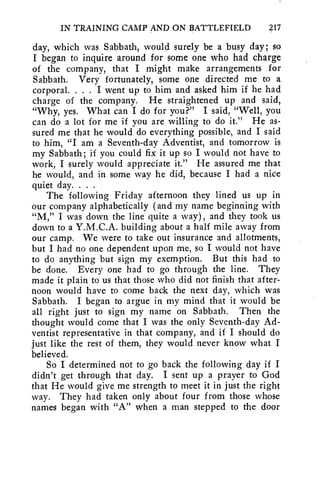
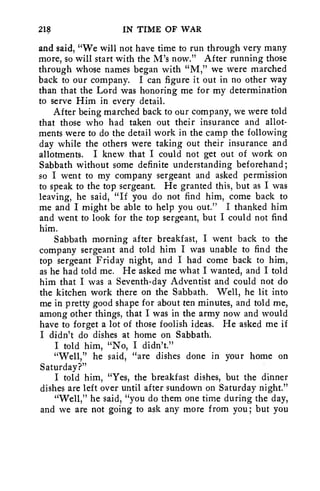
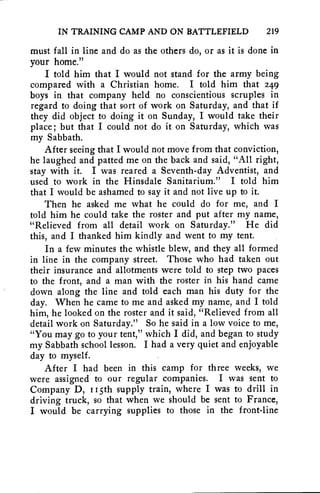
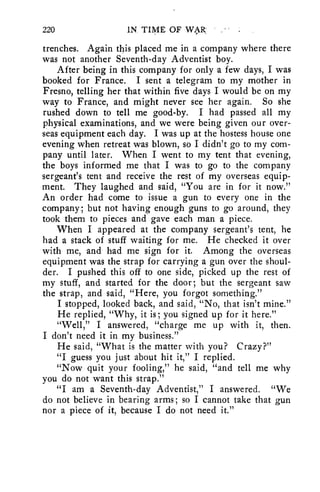
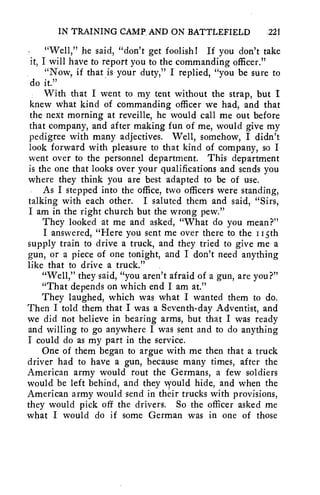
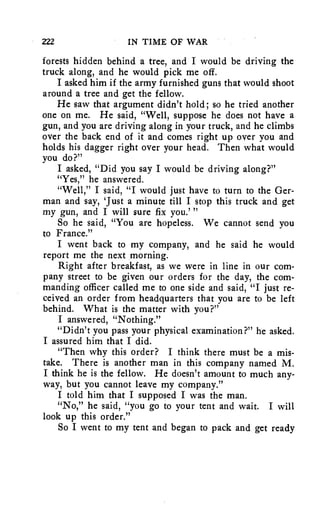
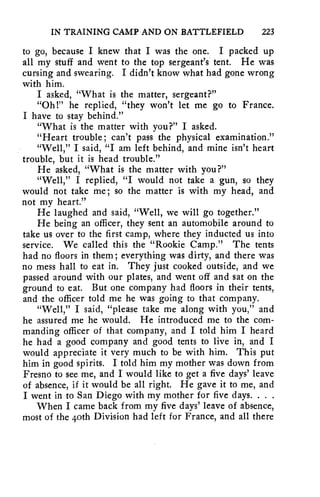
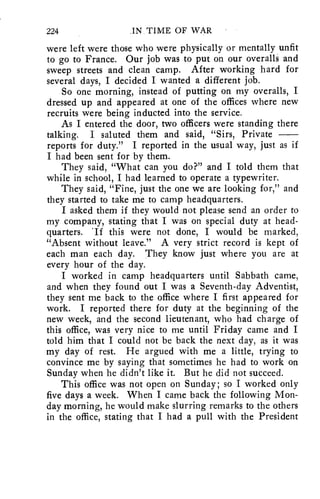
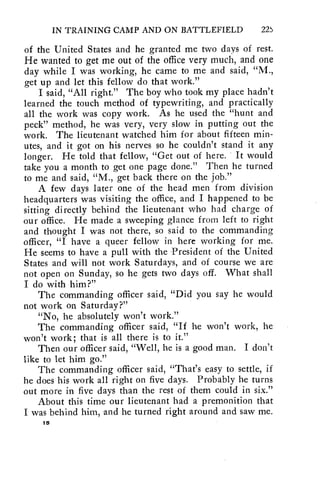

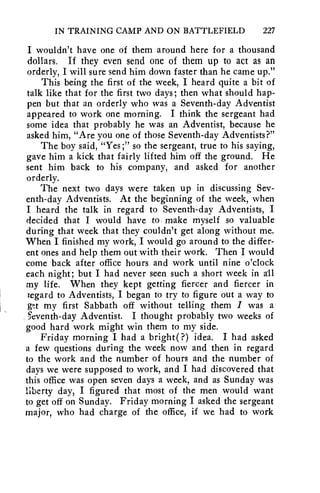
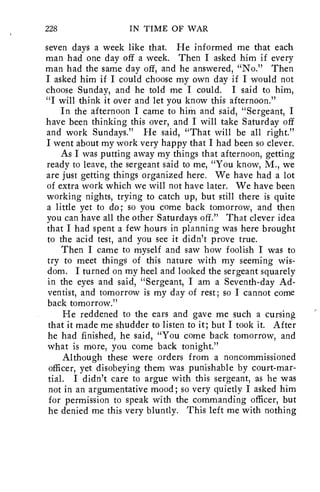
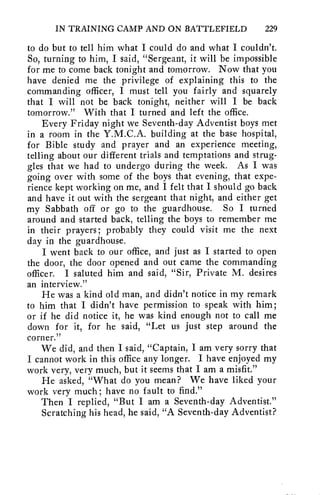
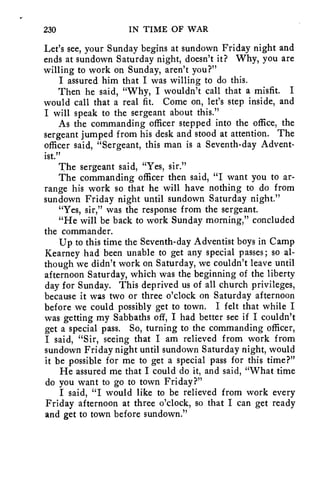
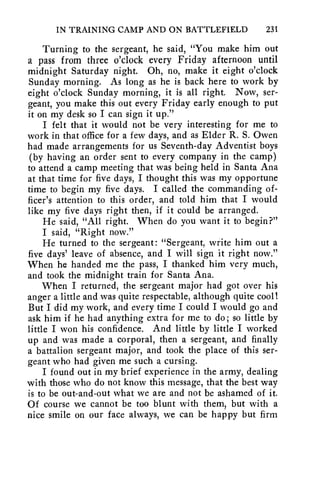
![232 IN TIME OF WAR
in our convictions. This experience has meant much to
me, and my only object in telling it is the hope that some
boy may be helped in the problems of his own life.
* * *
SERVICE IN NO MAN'S LAND
I served our United States Government eighteen months
during the World War. Of this time I served six months
on the front lines and five months in the Army of Occu-pation
on the Rhine. I first served in the infantry, but
God saw fit to prepare a way so that I was transferred to
a medical unit which consisted of a field hospital, base
hospital, and ambulance companies. I was placed in an
ambulance company, which is, of course, counted noncom-batant
service.
During my service on the front line I volunteered with
one of my buddies to get a wounded man out of no man's
land, who had lain in a shell hole for two days and three
nights. He was unable to walk or be carried without a
stretcher. Two other men had been trying to reach this
man, but failed, as they said it was too dangerous a task.
My buddy and I brought the wounded man, who was a
perfect stranger to us, to a place of safety. During this
effort we were constantly under shell and machine-gun
fire, but the God of heaven kept us safe. I wish to say
that I am willing to go through similar experiences again
for the sake of my fellow men and buddies or whoever
may need my help. I received a French Croix de Guerre
for bravery on the Soissons front. * * *
[See frontispiece]](https://image.slidesharecdn.com/itow1936-141101060711-conversion-gate02/85/Seventh-day-Adventists-in-Time-of-War-211-320.jpg)
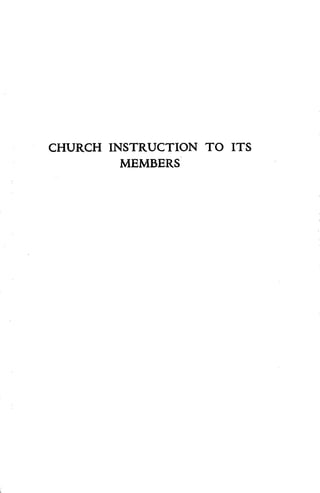
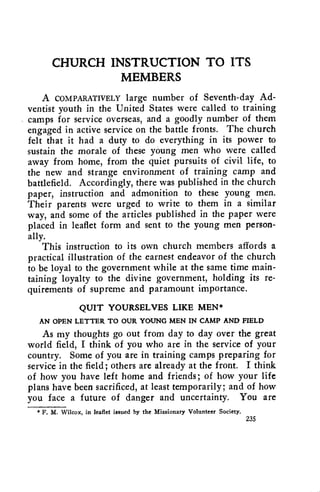
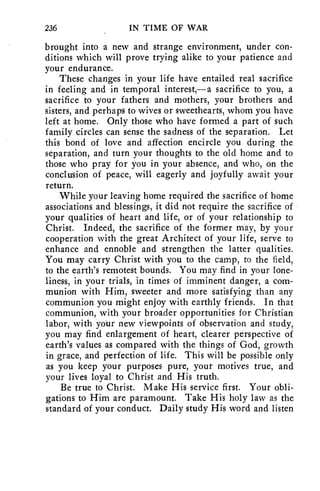
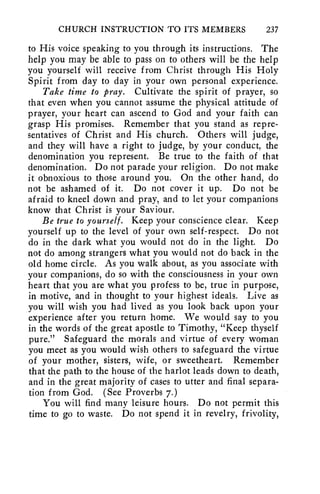
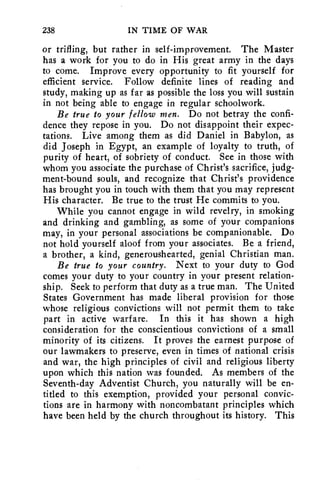
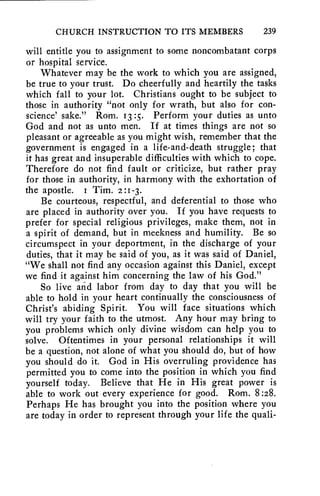
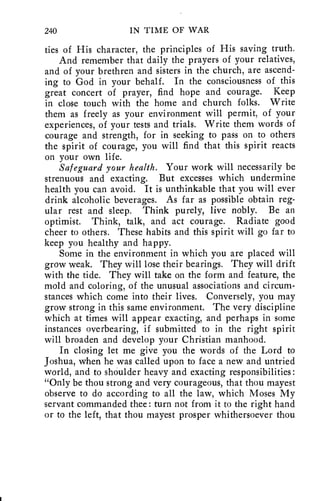
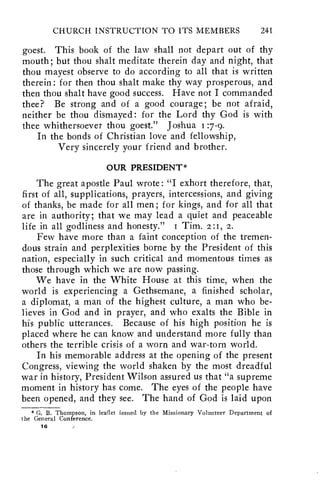
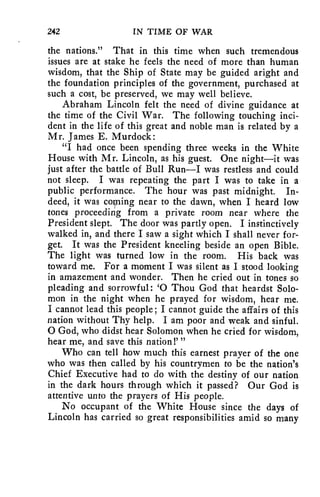
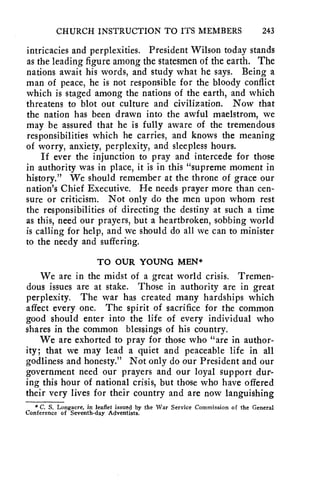
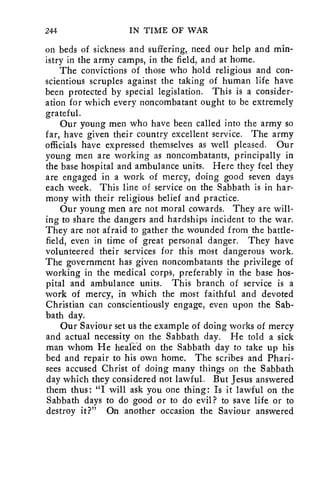
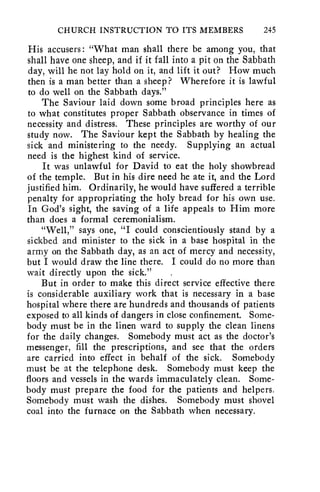
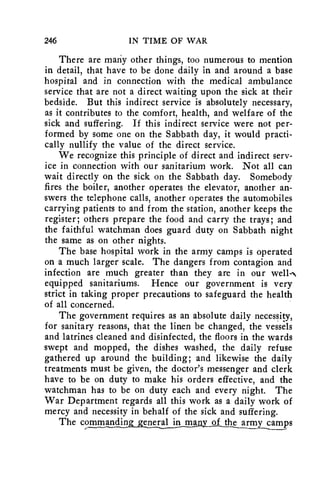
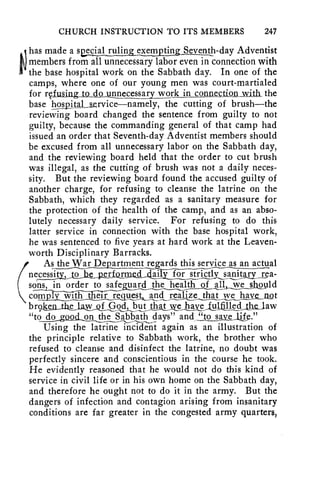
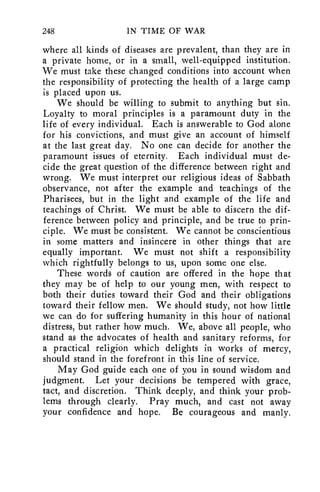
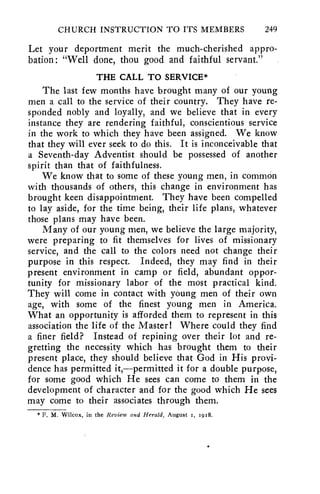
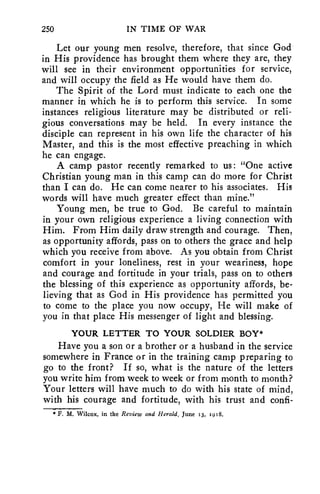
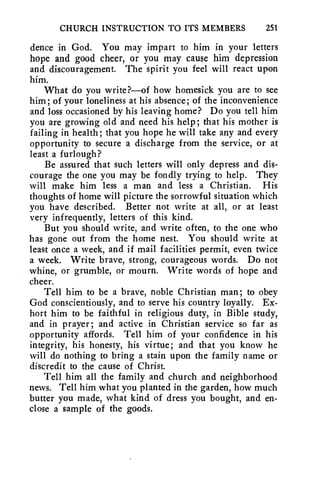
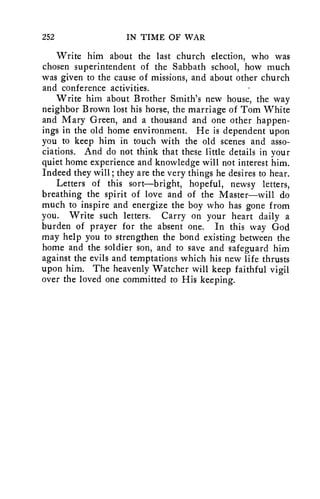
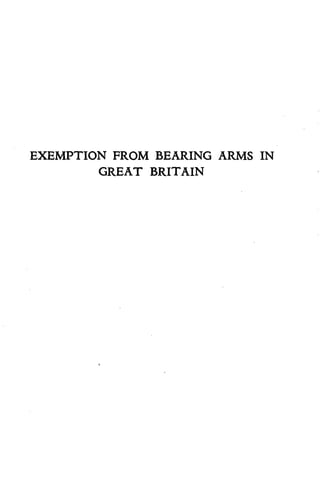
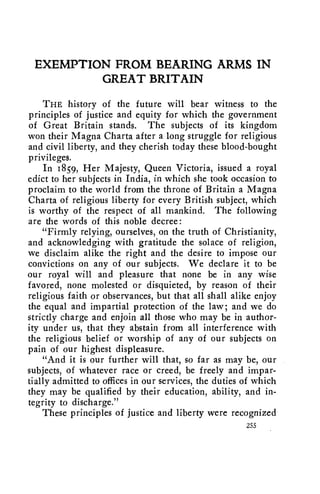
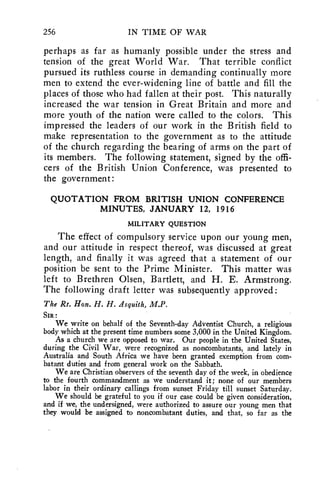
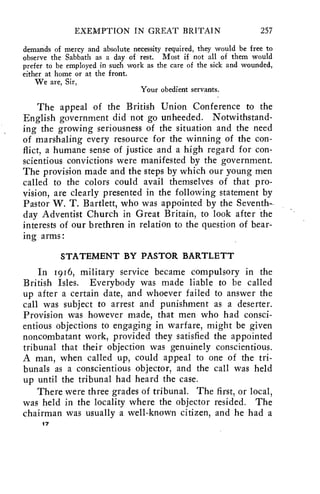
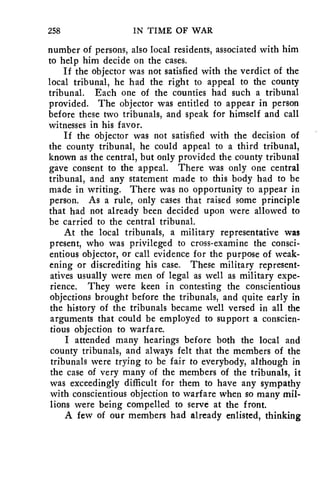
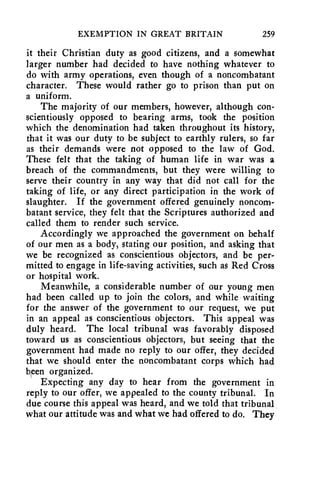
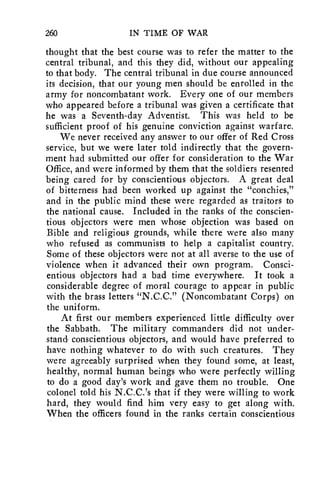
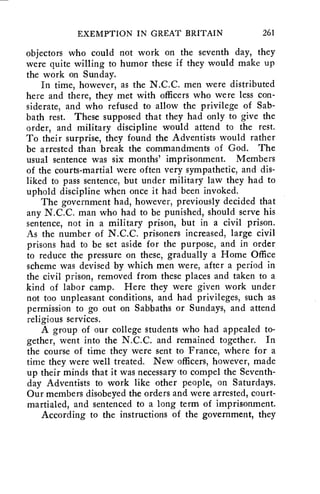
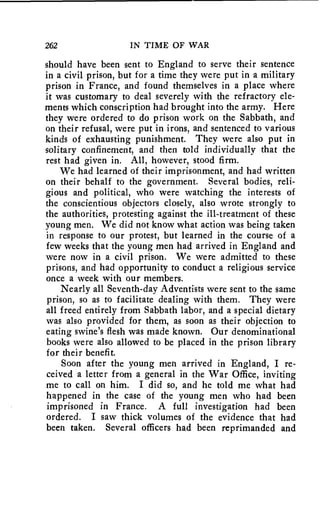
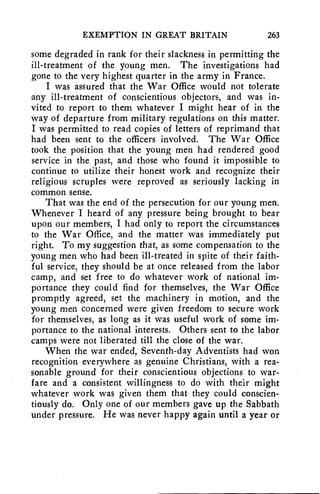
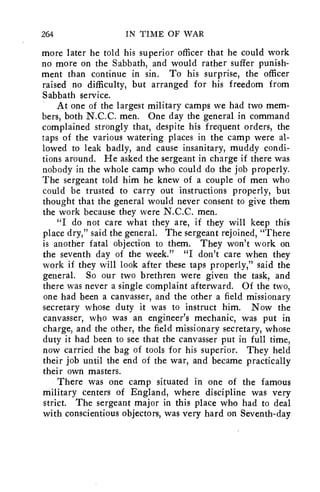
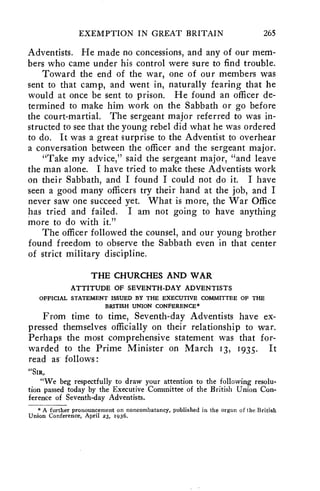
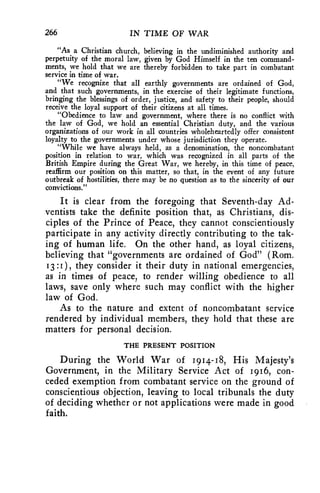
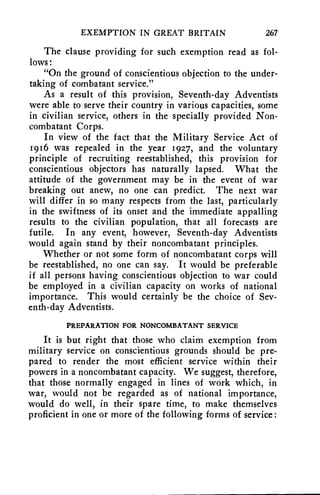
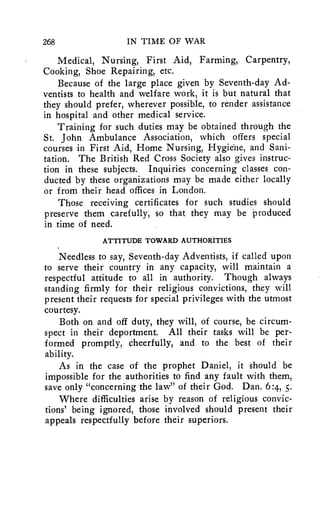
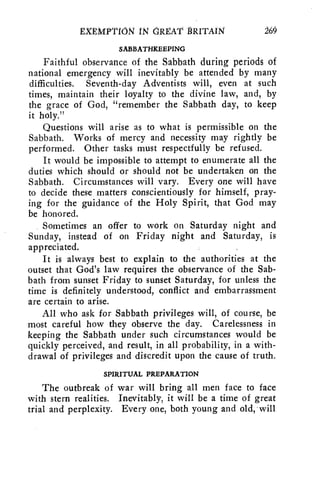
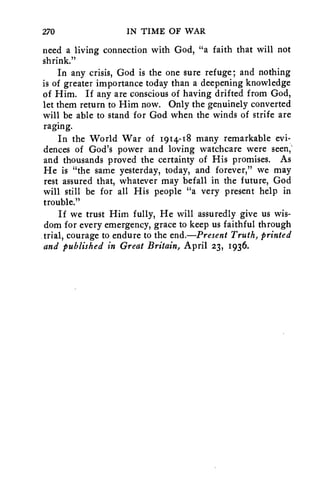
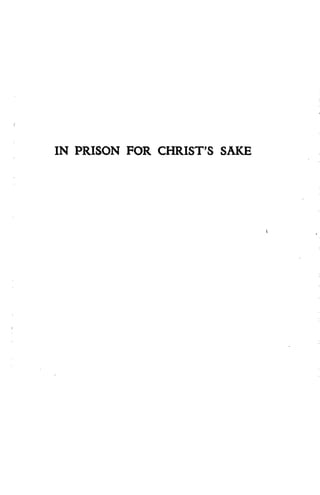
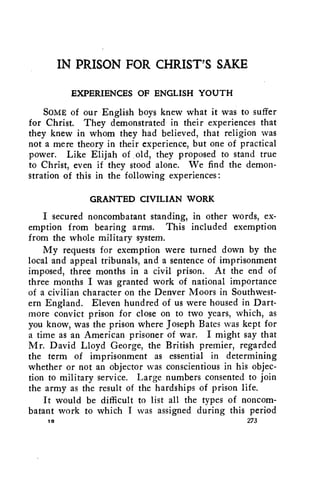
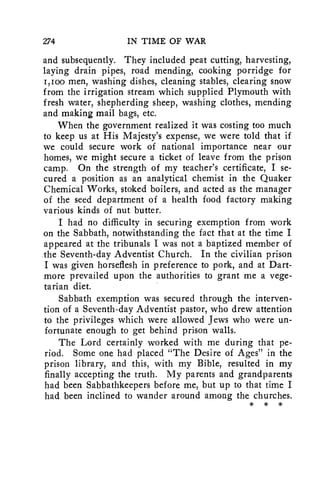
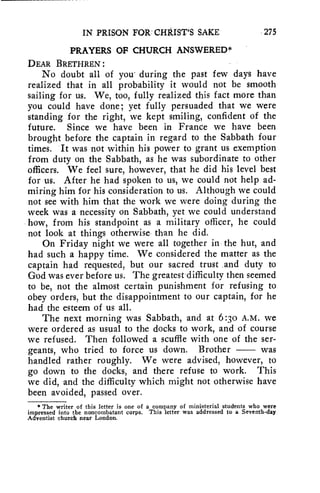
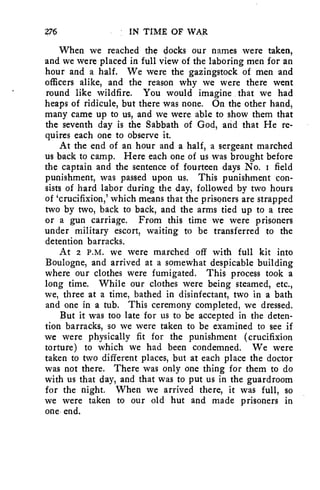
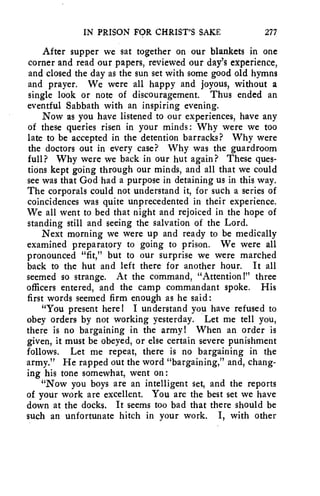
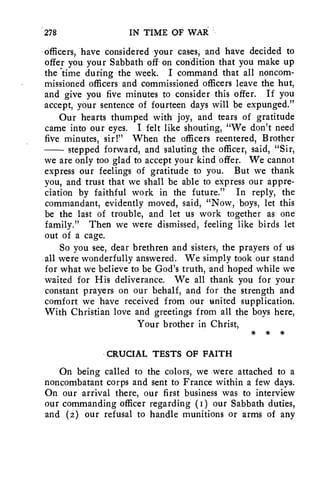
![IN PRISON FOR CHRIST'S SAKE 279
sort. He proved to be conciliatory, and having satisfied
himself that we were willing 'to tend the wounded, bury
the dead, or work at anything that came along night or
day, he gave us the exemptions we requested, and for a
year or so we worked under this arrangement.
On one occasion we were put to loading trains with
boxes that ultimately appeared to us to contain machine
gun parts and ammunition. We discreetly protested,
whereupon the officer commanding seemed quite satisfied
that our convictions were genuine, and we were assigned
other work. He had obviously tested us out.
Such experiences as these seemed to gain us the respect
of certain of the officers, though we were at all times sub-jected
to considerable abuse from other sources. Slowly
we were chosen in ones and twos for positions of some re-sponsibility.
Thus two of our men were at one time doing
the main part of the responsible work in a huge "dump,"
or depot, from which thousands of tons of timber, hut
sections, rails, etc., were despatched daily. The officer in
this depot was somewhat intemperate, but he knew our
men were not, and that they would never let him down.
He trusted them implicitly.
Others of our men were put in charge of the work of
gangs of enemy prisoners who were working behind the
lines.
Here is a typical experience of providential interven-tion.
One of our young men was working at the docks at
Le Havre in 1917. One day, as he was walking along be-neath
a maze of cranes and machinery engaged in unload-ing
vessels alongside the quay, a soldier in the fighting
forces called him suddenly. The young man stopped as
the soldier, obviously not long out of the filth and gore
of the trenches, said, "Excuse me, but you are the first C.O.
[Conscientious Objector] I've met, and I would like to
speak to you. I believe you are a—"](https://image.slidesharecdn.com/itow1936-141101060711-conversion-gate02/85/Seventh-day-Adventists-in-Time-of-War-255-320.jpg)
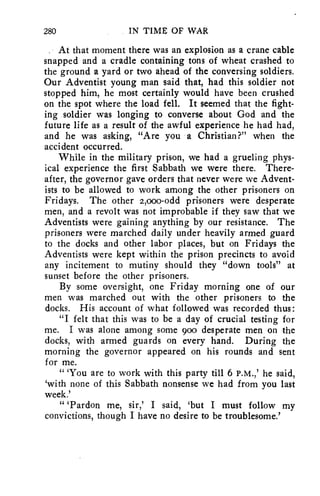
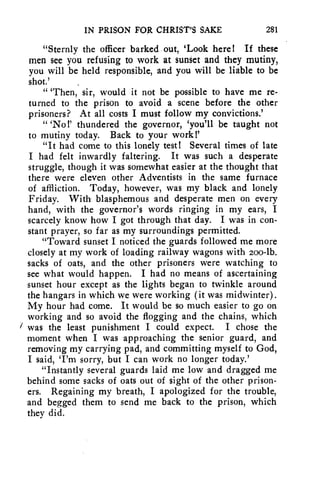
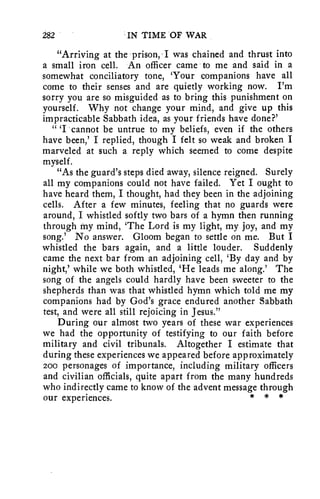
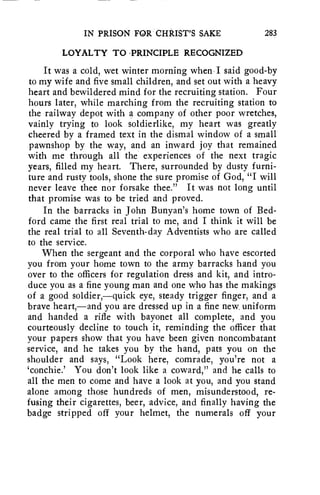
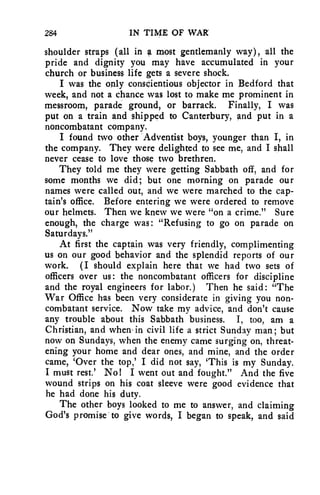
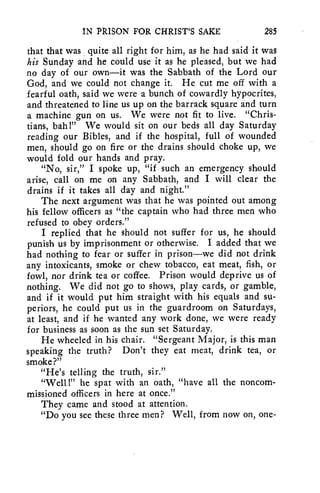
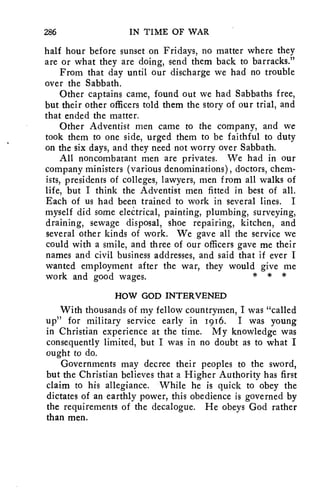
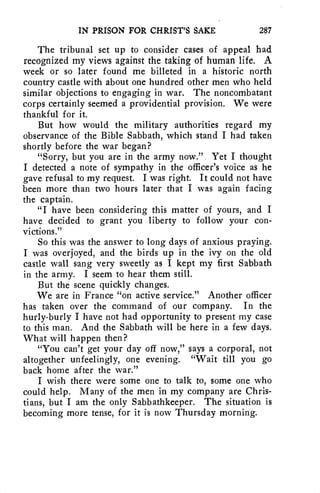
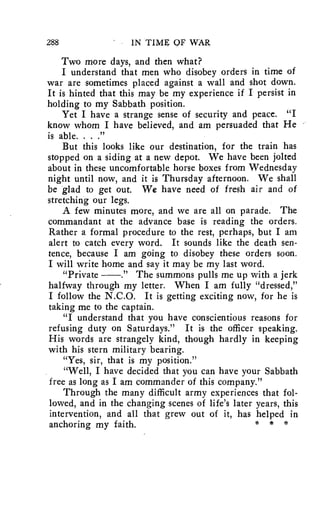
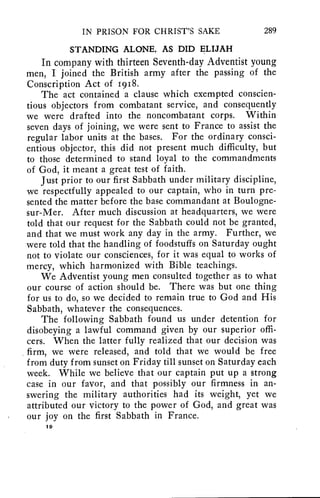
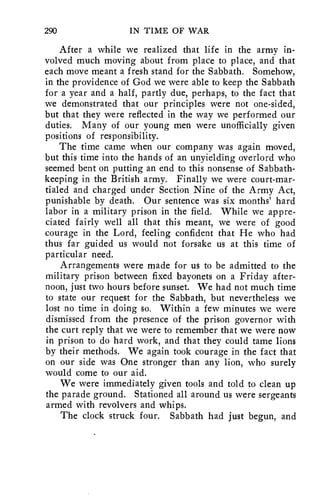
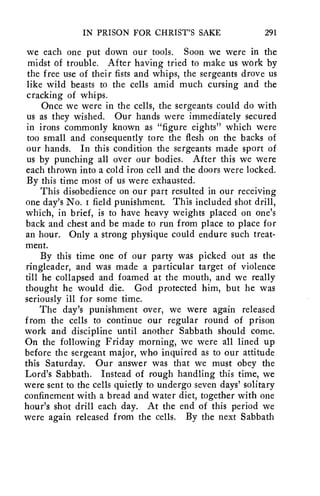
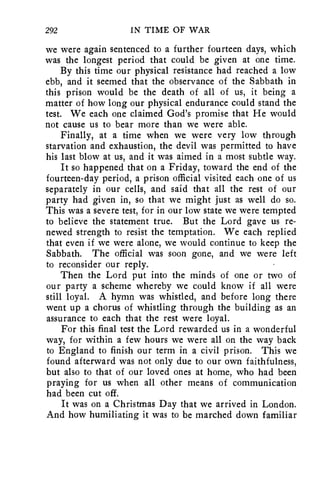
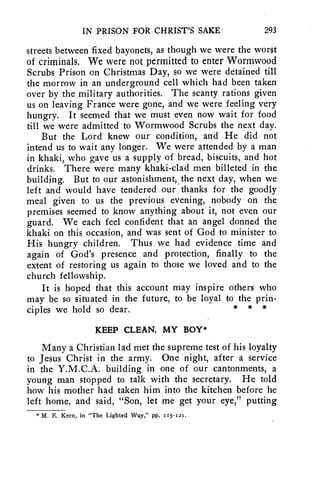
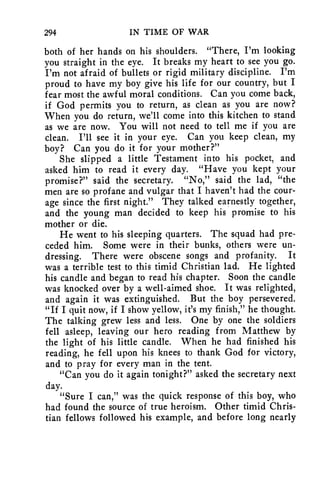
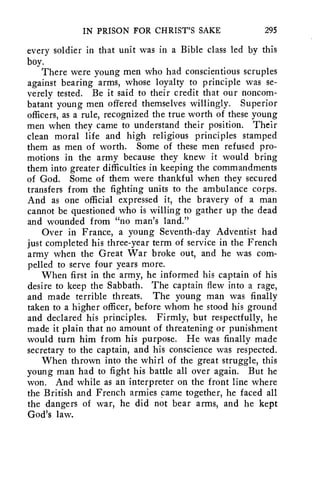
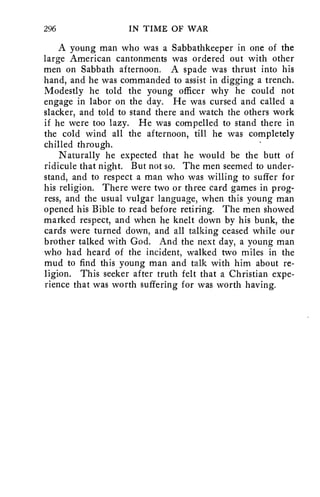

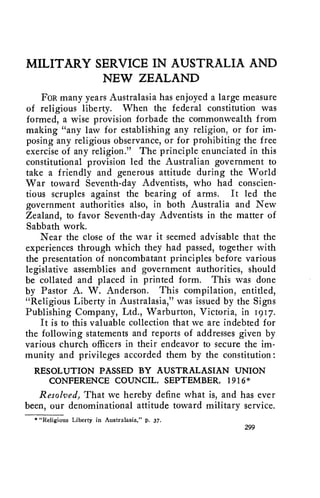
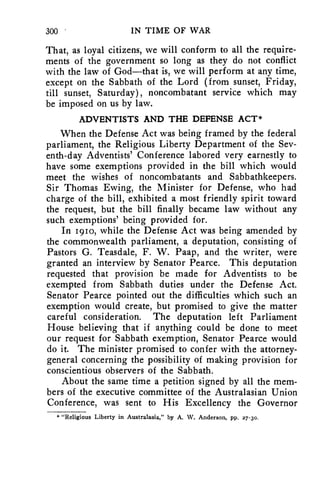
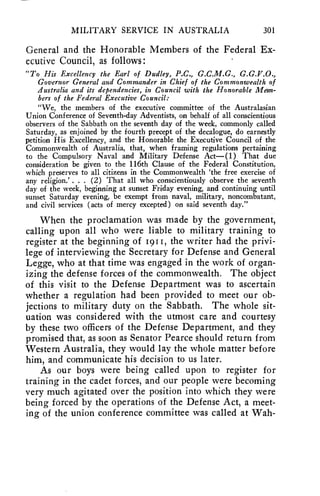
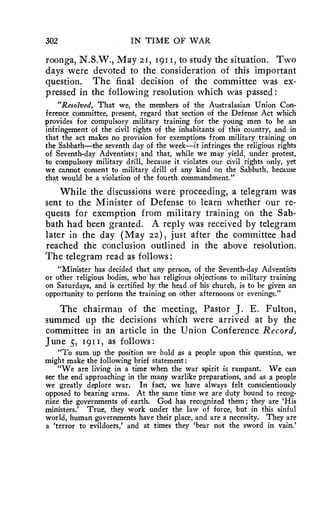
![MILITARY SERVICE IN AUSTRALIA 303
As Christians we must allow governments the right to defend themselves
against both internal and external foes.
"And further, from the experience of God's remnant people during
the Civil War of America, we are taught it is our duty to go with the
government just as far as we can, and pray to the God of nations to give
wisdom to act and grace to endure. Rash words and fanatical boasting
at such a time are evil and truly deplorable. A great test is coming to
God's people, and we shall certainly be severely tried. And while we
shall no doubt be known as a people with strong convictions against bear-ing
arms, yet the testing point with us in the great conflict will be over
the Sabbath. And shall we not now be profoundly grateful to God that
He has granted us favor with the government in this respect under the
present issue?"
That the government had already granted our request
for exemption from military training on Sabbaths before
this meeting took place, although we had received no in-timation
of it, is evident from the fact that, six weeks
earlier, the following letter had been sent to the military
commandants in all states :
"HEADQUARTERS, MELBOURNE, April 7, 1911.
"Military Commandants,
"All States.
"The Minister has decided that, if any person of the Jewish, Seventh-day
Adventist, or other religious body, certified to by the head of his
church, has religious objection to military training on Saturdays, oppor-tunity
is to be given to perform the training on other afternoons or nights.
"The training is not, in any case, to be less than that which would
have been ordinarily performed had he attended with the remainder of his
company.
"Under ordinary circumstances, U. T. Regulations 28 (a) will meet
the case.
"[Signed] J. G. LEGGE,
"D. of 0."
ESTABLISHING OUR DENOMINATIONAL STATUS AS
NONCOMBATANTS BEFORE THE NEW
ZEALAND GOVERNMENT*
It is very gratifying to know that the privileges which
are enjoyed under the voluntary system of defense in Aus-tralia
have also been conceded to Sabbathkeepers and non-
* "Religious Liberty in Australasia," pp. 38-42.](https://image.slidesharecdn.com/itow1936-141101060711-conversion-gate02/85/Seventh-day-Adventists-in-Time-of-War-278-320.jpg)
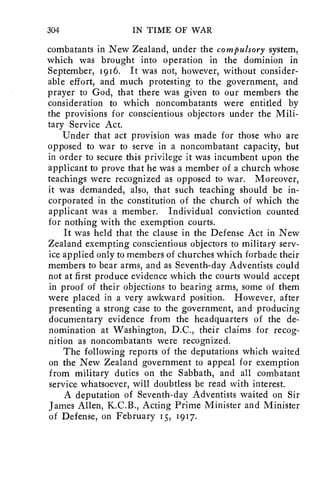
![MILITARY SERVICE IN AUSTRALIA 305
The purpose of the deputation was to place before the
minister the noncombatant and Sabbathkeeping principles
of the body. Mr. J. B. Donald, of Auckland, introduced
the deputation, which was a large one, and at the same
time, on behalf of the denomination, complimented Sir
James Allen on the honor that His Gracious Majesty the
King had been pleased to bestow on him.
Pastor W. H. Pascoe, president of the North New
Zealand Conference, addressed the Right Honorable Sir
James Allen, K.C.B., Minister of Defense, as follows :
"SIR, on behalf of the New Zealand Conference of
Seventh-day Adventists, we desire, first of all, to express
our sorrow and also our heartfelt sympathy with the gov-ernment
in the loss sustained by this dominion in the de-cease
of your late colleague, that loyal, upright patriot and
statesman, the Right Honorable Dr. McNah. In this time
of national peril, we can understand how this calamity
must add to your many other perplexities in guiding the
ship of state for the best welfare of all on board, and we
do, therefore, heartily appreciate and thank you for the
privilege you grant us today of presenting the request of
this deputation before you.
"We can assure you that it is far from our desire to
add to your perplexities, and, therefore, we have refrained
from presenting any petition until the exigencies of the
present military situation have compelled us to seek your
protection and help. In doing this we believe that we are
acting in harmony with our divine Master, who has in-structed
us that 'he [the civil ruler] is the minister of God
to thee for good' (Rom. 13 :4), and that we 'must needs
be subject not only for wrath, but also for conscience' sake.'
Rom. 13 :s.
"In the early history of our denomination, at the time
of the Civil War in the United States, in 1865, our attitude
was defined and published and accepted by this body as a
20](https://image.slidesharecdn.com/itow1936-141101060711-conversion-gate02/85/Seventh-day-Adventists-in-Time-of-War-280-320.jpg)
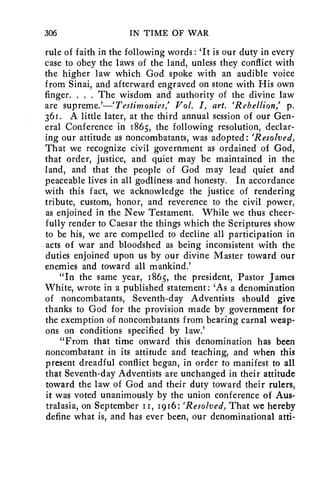
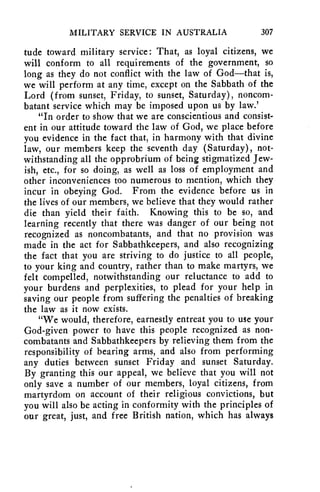
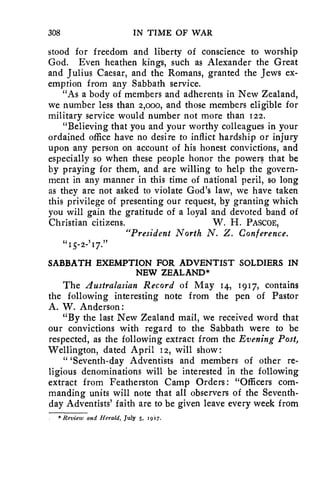
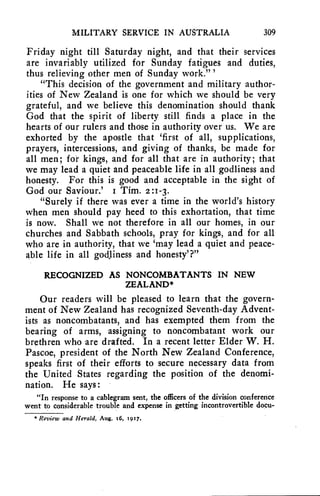
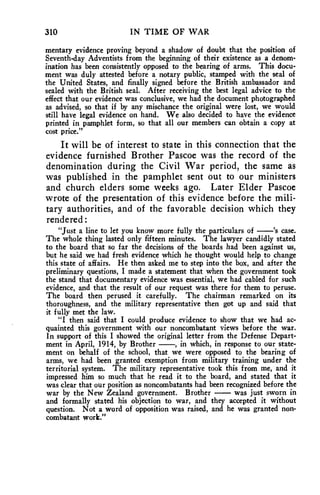
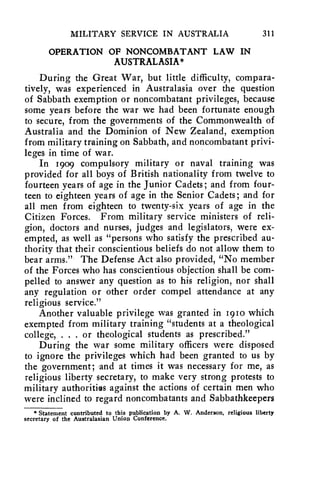
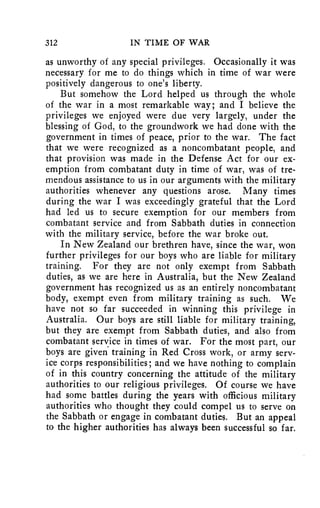
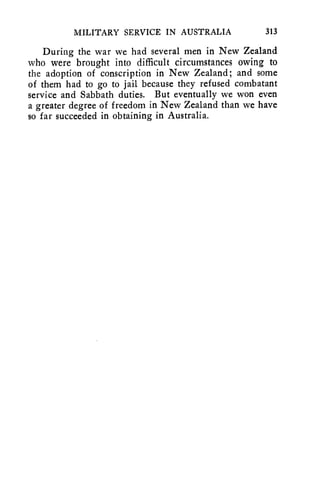

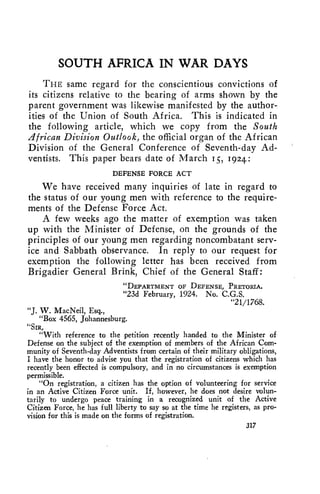
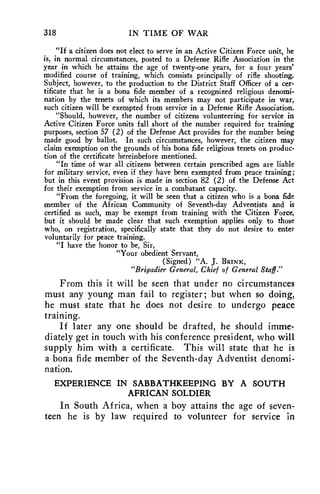
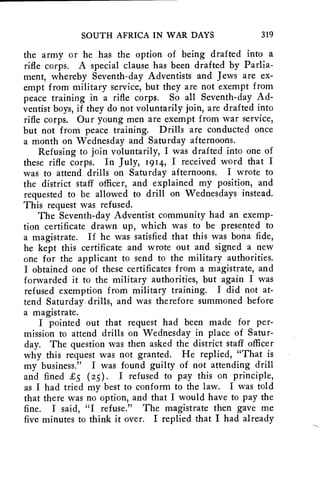
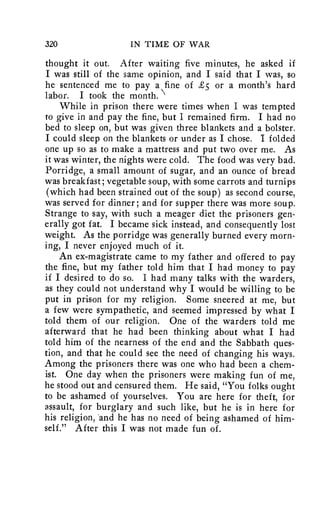
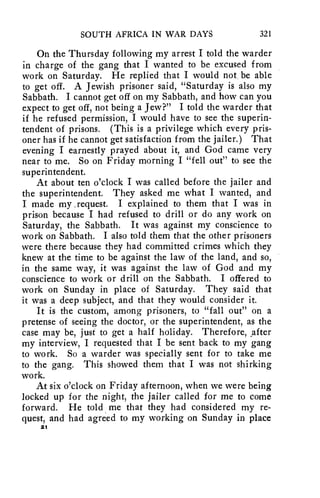
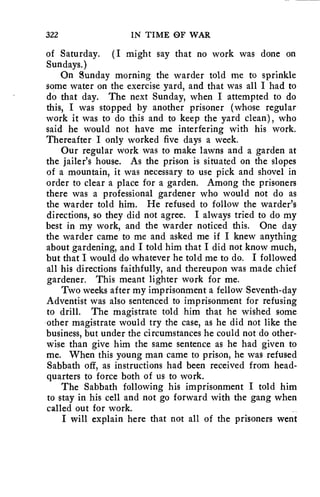
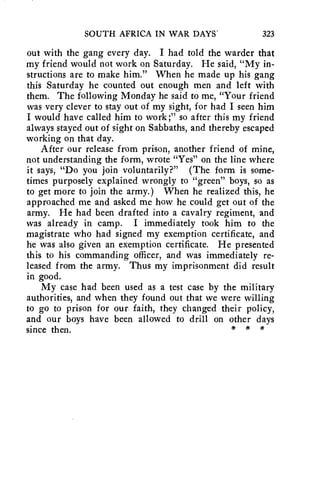

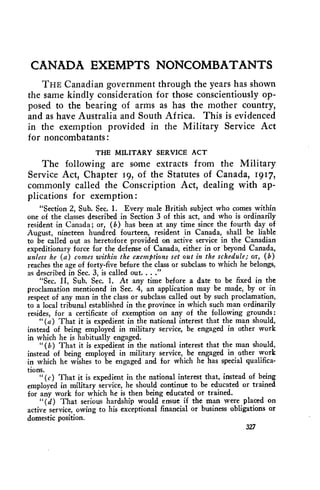
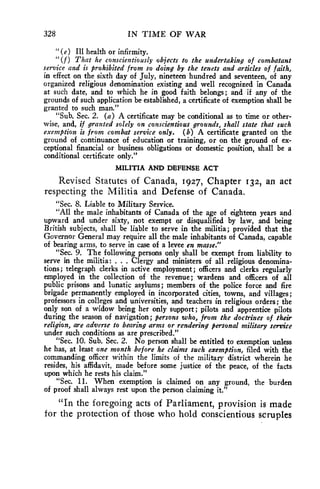
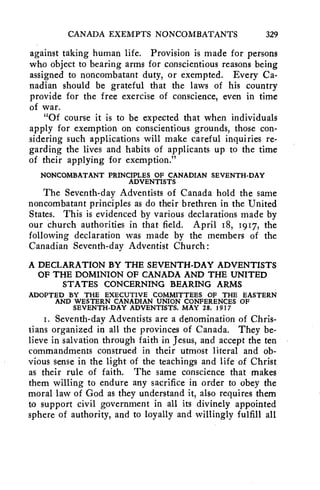
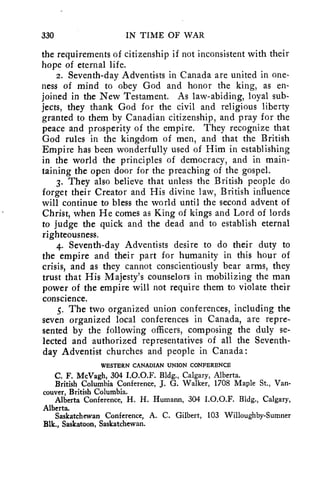
![CANADA EXEMPTS NONCOMBATANTS 331
Manitoba Conference, E. M. Chapman, -418 Lansdowne Ave., Winni-peg,
Manitoba.
EASTERN CANADIAN UNION CONFERENCE
A. V. Olson, Oshawa, Ontario.
Ontario Conference, H. M. J. Richards, Toronto, Ontario.
Quebec Conference, W. C. Young, Box 377, Lennoxville, Quebec.
Maritime Conference, G. H. Skinner, 184 Winslow St., St. John, New
Brunswick.
They most respectfully petition that they be recognized
as a denomination as noncombatants, and that they be given
the consideration guaranteed to all whose religious beliefs
forbid the bearing of arms, in accordance with British
constitutional precedent, the present statutory laws of the
empire respecting military service, and the royal edict of
the late Queen Victoria concerning the noninterference
with religious belief, as hereunto appended.
We also beg to refer you to the recognition given this
denomination by the United States of America during the
Civil War and at the present crisis.
Please refer to the attached appendices.
(Signed) H. M. J. RICHARDS,
President Ontario Conference.
Secretary.
Ottawa, May 28, 1917.
[EDITORIAL NOTE.—In September, 1933, another pro-nouncement
concerning the bearing of arms was made by
the executive committee of the Canadian Union Conference
of Seventh-day Adventists, and forwarded to representa-tives
of the Canadian government. This declaration was
expressed in the following words :]
"TO HIS MAJESTY'S GOVERNMENT IN CANADA
"Greetings:
"The union conference of Seventh-day Adventists of
the Dominion of Canada, through its executive committee,](https://image.slidesharecdn.com/itow1936-141101060711-conversion-gate02/85/Seventh-day-Adventists-in-Time-of-War-302-320.jpg)
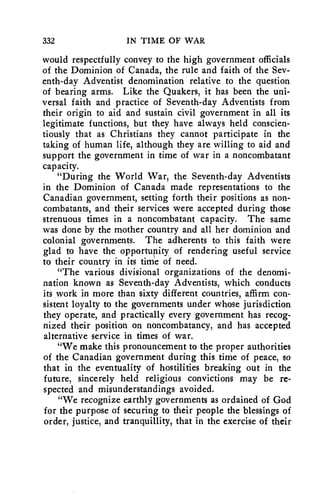
![CANADA tXtMPTS NONCOMBATANTS jjJ
legitimate functions such governments should receive the
loyal support of their citizens.
"We assert the justice of rendering tribute, custom, and
honor to earthly governments, as enjoined in the New
Testament.
"We revere the law of God contained in the decalogue,
as explained in the teachings of Christ and exemplified in
His life. For that reason we observe the seventh-day Sab-bath
(Saturday) as sacred time; we refrain from secular
labor upon that day, but engage gladly in works of necessity
and mercy for the relief of the suffering and for the uplift
of humanity."
[EDITORIAL NOTE.—In 1934 the Canadian Union Con-ference
of Seventh-day Adventists published a brochure of
sixteen pages, giving the sections from the Military Service
Act and the revised statutes of Canada quoted in preceding
pages, also the declaration to His Majesty's government
in Canada, made in September, 1933. In addition to these
laws and pronouncements, the pamphlet contained the
following information and counsel to the members of the
church who might be subject to military service:]
CLASSIFICATION OF CONSCIENTIOUS OBJECTORS
Citizens who feel conscientiously unable to participate
in war are generally referred to as "Conscientious Ob-jectors."
They may be roughly divided into three classes:
i. Those willing to undertake any military duty apart
from the actual taking of life.
2. Those who are willing to undertake military duties
not directly connected with the taking of life. For
example, they are prepared to serve in medical,
ambulance, and noncombatant corps, but are un-willing
to transport arms and ammunition, erect
fortifications, or engage in similar work closely
connected with the taking of human life.](https://image.slidesharecdn.com/itow1936-141101060711-conversion-gate02/85/Seventh-day-Adventists-in-Time-of-War-304-320.jpg)
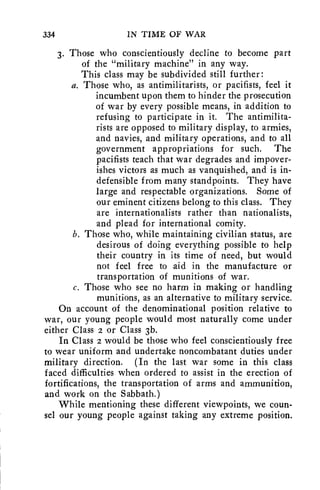
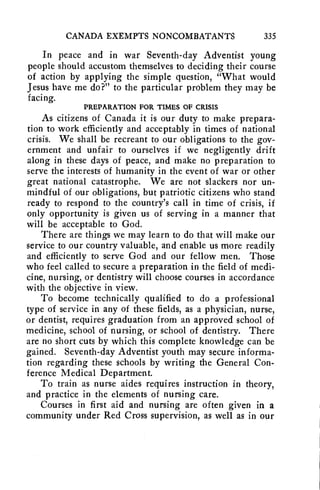
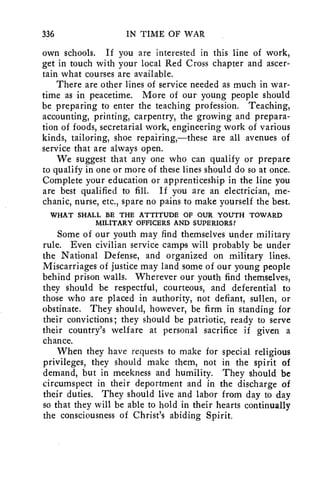
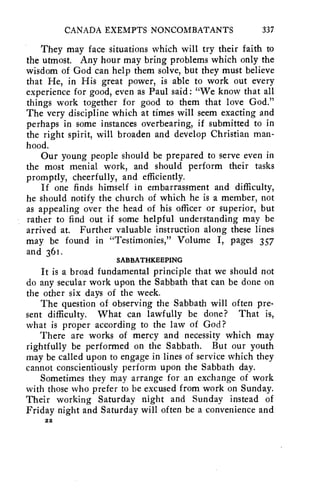
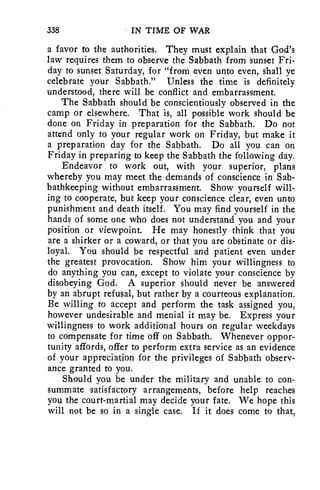
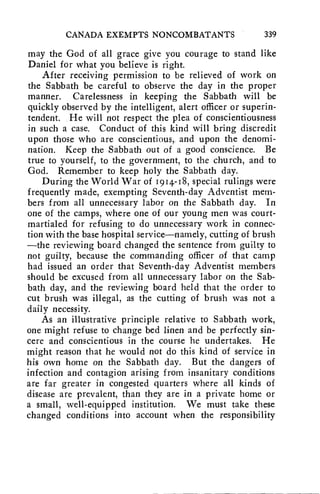
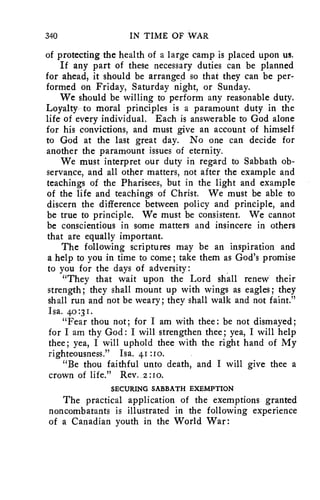
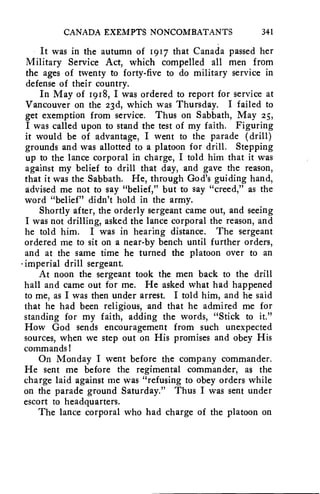
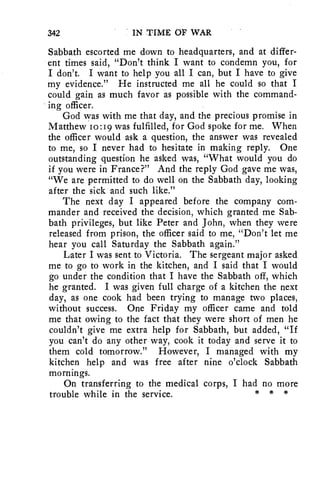
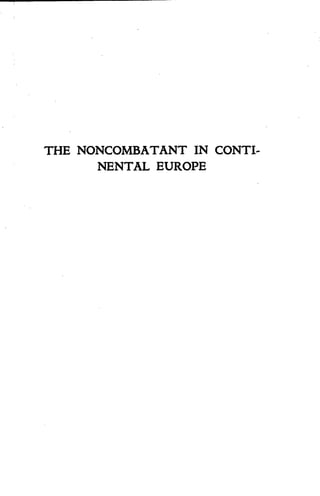
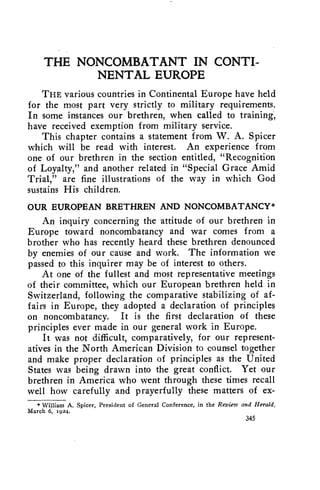
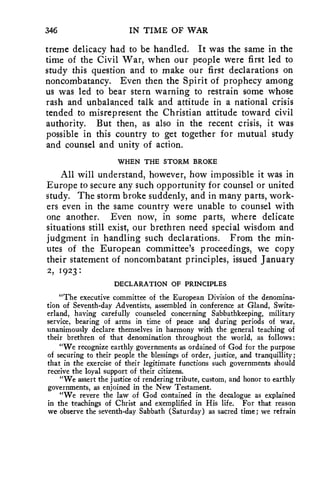
![THE NONCOMBATANT IN EUROPE 347
from secular labor upon that day, but engage gladly in works of necessity
and mercy for the relief of suffering and the uplift of humanity; in peace
and in war we decline to participate in acts of violence and bloodshed. 'We
grant to each of our church members absolute liberty to serve his country,
at all times and in all places, in accord with the dictates of his personal
conscientious conviction."
In addition to this statement a special statement was
made by the representatives of the German unions, as
follows :
"At the Council of the European Division committee in Gland, Switz-erland,
Dec. 27, 1922, to Jan. 2, 1923, our position during the war as
it had been expressed in different documents was reviewed, and we herewith
by our own signatures confirm anew, what had already been declared at
Friedensau in 1920, our regret that such documents had been issued. We
are in full harmony with the statement adopted by the Council today
[Jan. 2, 1923]."
FOR THE INFORMATION OF OUR PEOPLE
This additional special note, signed by some of the
representatives of our work in Germany, had reference to
positions taken by individuals in those early war days
when generally the workers were struggling much alone,
in the midst of the whirlwind. Others of their associates
at the time did not feel they could approve these positions,
and when there was opportunity to study the question to-gether,
and to learn of the declaration and principles laid
down in the early history of our denomination, all united
as brethren in regret for faulty conceptions, and in ad-herence
to the principles adopted by our people in the
early years of our work.
We give these facts for the information of our people
in America, that all may understand the position of our
brethren in Europe. Our brethren in the churches, we
know, do not expect us to reply to the complaints of ele-ments
that go out from us because they are not of this
movement, and seek to draw others after them. When any
one goes about denouncing and accusing brethren, far or
near, those who know the gospel of the third angel's mes-](https://image.slidesharecdn.com/itow1936-141101060711-conversion-gate02/85/Seventh-day-Adventists-in-Time-of-War-317-320.jpg)
